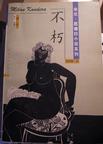不朽
出版时间:1998-9 出版社:青海人民出版社 作者:米兰.昆德拉 译者:安丽娜
Tag标签:无
用户评论 (总计26条)
- 医院莱阳开病假条【ΩΩ:535982237】莱阳医院开诊断证明医院莱阳开病假条【ΩΩ:535982237】莱阳医院开诊断证明医院莱阳开病假条【ΩΩ:535982237】莱阳医院开诊断证明医院莱阳开病假条【ΩΩ:535982237】莱阳医院开诊断证明医院莱阳开病假条【ΩΩ:535982237】莱阳医院开诊断证明医院莱阳开病假条【ΩΩ:535982237】莱阳医院开诊断证明医院莱阳开病假条【ΩΩ:535982237】莱阳医院开诊断证明医院莱阳开病假条【ΩΩ:535982237】莱阳医院开诊断证明
-
看《不朽》完全是一个意外,在图书馆没有借到《不能承受的生命之轻》便随便借了本昆德拉的小说,结果刚开始看我就被主角阿涅丝吸引住了。一个身体向上,脑袋向下,向往孤独,向往自然,向往纯粹,给生活做减法的女性。虽然最后阿涅丝的死让人很遗憾,但是也不得不说这是阿涅丝从现实逃离之后最好的结果,因为她就算她达到纯粹的自然她也不可能摆脱这个社会还有人事的困扰。中国有句古话小隐隐于野,中隐隐于市,大隐隐于朝。
<这句话自古流传很广,有很多版本,如:“小隐隐于野,中隐隐于市,大隐隐于朝。”;“小隐在山林,大隐于市朝。”等,说的都是一个意思:那些所谓的隐士看破红尘隐居于山林是只是形式上的“隐”而已,而真正达到物我两忘的心境,反而能在最世俗的市朝中排除嘈杂的干扰,自得其乐,因此他们隐居于市朝才是心灵上真正的升华所在。意思是说有能力的人希望依赖周围的环境忘却世事,沉湎于桃源世外,这是指小隐真正有能力的人却是匿于市井之中,那里才是藏龙卧虎之地,这是指中隐只有顶尖的人才会隐身于朝野之中,他们虽处于喧嚣的时政,却能大智若愚、淡然处之,这才是真正的隐者。>va:http://zhidao.baidu.com/link?url=DQX1qR3K6VCHlihIgR9wdavIKevFbX5oEYtCQSPW3CUR9hUI0nbtxuifV1F0DONB3ZI1vZZFbL2GqxJPzbGWr_
每个人心中都有个阿涅丝,都有个逃离的梦想,也许我们会因为家庭,事业等等原因不能归隐,但是我们可以想办法和这个社会调谐,大隐隐于市。物我两忘,大智若愚,排除无用的世俗纷扰。不过,这个才是处事的智慧与精华所在。 - 忽然之间-读米兰·昆德拉《不朽》有感
阿涅丝很久没有做那个手势了:突然停下,慢慢地回头,甩出自己的右手,在半空中,缓慢而优雅地招手;她的丈夫保罗像一只自动风箱一样工作着,他就是这样感知自己的肉体,愉快地忘却它的存在。他和阿涅丝看起来是一对很好的夫妻,默默相伴;洛拉和她姐姐阿涅丝追求的本质是截然不同的,小时候躲在花园草丛里看到阿涅丝做出那个手势时,她是多么的感动,激动地挥了挥手,僵在空中……
这是“不朽”的手势吗?
不朽——存在于人类的记忆或记载中永不磨灭,这看起来真是一个伟大的词。米兰·昆德拉说:“不朽分为大的不朽和小的不朽。小的不朽是指一个人在认识他的心中留下的回忆;大的不朽是指一个人在不认识的人的心中留下了回忆。”洛拉把双手放在胸口上,然后又把双手向前投,贝蒂娜也是如此。这个手势米兰·昆德拉称之为“不朽的手势”,就像贝蒂娜所说:“我希望超越我自己,成为历史的一部分,因为历史是永恒的记忆。”而我觉得这不朽恰恰是极权主义的一种隐秘的表现,一种自己记忆的扩张。像希腊电影《犬牙之家》里父亲运用极权重新定义词语来控制高强内孩子的思想一样,不朽正悄悄地重新定义了别人的自我,并输入我们脑子里。就像条件反射一样,贝多芬——“不朽而又伟大的音乐家”,歌德——“不朽而又伟大的文学家”,马克思——“不朽而又伟大的无产阶级革命者”……他们超越了自己的时代,在后人的记忆中留下了难以磨灭的印象,这不朽从某种程度上来说难道不正是一种变相的专制吗?有人会反驳:“这样的人是通过他们的功迹与努力,难道不应该被我们记忆?”当然应该,只是不朽并不如记忆如此单纯。
“阿涅丝躺在草丛中,小溪单调的潺潺声穿过她的身体,带走她的自我和自我的污秽,她具有这种基本的存在属性,这存在弥漫在时间流逝里,弥漫在蔚蓝的天空里,她知道,从此以后,再也没有最美的东西了。”我知道,阿涅丝的减法在这一时刻真正完成了,她减去了她的“我”的所有表面性和外来的东西,用这种方法接近她的本质。她是冒险而又理智的,阿涅丝时常让我感动,阿夫纳留斯画了幅画,这就是阿涅丝,
身体像火焰一样升起,但她的头总是略微塔拉着,凝视底下,抱着怀疑的头。
阿夫纳留斯说他更喜欢洛拉她充满幻想的脑袋仰望天空。但是她的身体坠下地面:屁股和乳房——也是沉甸甸的,往下凝视。
当这两幅画放在一起时,我意识到了这姐妹本质的不同,也就是自我存在方式与表现形式的天壤之别。洛拉的身体与灵魂是分离的,扩张似的将自我无线放大,同时让自己展翅飞翔,飞达云端,成为不朽,成为众人仰望甚至触不及的对象。而阿涅丝她将自己的灵魂和肉体聚焦到了一个点, 折回自我,抓住灵魂,她没有洛拉强烈不朽般的欲望,相反她拒绝,甚至表达了一种自我消失的欲望,而比起洛拉,更加让我感动的是阿涅丝。
“人生所不能承受的,不是存在,而是作为自我的存在。生活,生活并无任何幸福可言。生活,就是在尘世中带着痛苦的自我。然而存在,存在就是幸福。存在:变成喷泉,在石头的承水盘中,如热雨一盘倾泄而下。”
而我也相信,没有什么永垂不朽。
- 《不朽》第二部分第15至第17章,歌德与海明威在穿越对谈中,对不朽可谓深恶痛绝。荣名反成无以弃绝的负担,何以如此?
不朽是生存另一种形式的继续。作为有自我意识的动物,人需要不朽来对抗死亡的恐惧。这是E.Becker反复强调的主题。显而易见,不朽的全部意义在于生而不在于死。
作为个体的人并不具备神格,自我无法为自我加冕,赋予自我以绝对的、源于自身的、不依赖他者的意义和价值,从而实现绝对的不朽,而是必须寄生在既有的价值体系中,获取相对的意义和价值,以他者的认可来实现不朽。这是将自我不堪承担的生命或存在的重负放在众人的肩上。
然而,这种不朽是相对的。它寄生于他者之上,为他者所摆布。自我在得到不朽的同时,也就丧失了对它的控制。自然,在对抗死亡时它有所助益,但只是缓解了作为动物的人在面对死亡时的焦虑与恐惧,却并未实现自我的超脱(self transcendence)。不朽在这里成了自我的异物。
这种表现为身后之名的不朽,对如歌德、海明威者来说,毫无意义。 - 在《不朽》第一部分的第3章,face象征着存在的唯一性、独特性。在第七节,face则揭示了自我的割裂。
人终生为存在的意义所折磨。因为存在无意义的事实直接威胁人的存在,所以人竭力以赋予其意义来压抑、遗忘这个事实,而自我的独特性、唯一性恰是意义得以确立的基础。face作为绝对异于他者的符号成为自我独特性、唯一性的象征,毫无意外地顺理成章。
然而,人不是神,不是造物者,不可能赋予自我以意义。在既有的价值体系内寻找自我肯定、价值和意义,是最为安全、易行的方式,但须以契合该价值体系为牺牲。在这种情形下,自我呈现的是迁就价值体系的、供其审视的、自我阉割的自我,所展现的face只是个自我丧失控制权的面具。自我就是在这里与face出现了割裂。
正如小说中写到的,杂志里每一张脸的照片,看似意在突显自我的独特与唯一,其实是竭力将自我镶嵌到杂志这个安全的体系里。这是个共谋的游戏,每一个个体都获得了价值,再无需独力证明自我的意义。但自我却消失了,所有的照片混作一处,每一张都面目不清!
自觉者少,自力者更少。人多潜移默化接受了既有的价值体系,托其庇护得以不受质疑存在本质的困扰,早已不自觉。但即便自觉者,又有多少能够与既有价值体系切割,卓然独立于世,自行超脱为神,赋予自我以意义和价值?因此,懵懂者快乐,自觉者痛苦。
这是为什么站在镜子之前,面对镜中的face,Agnes扪心自问:This is my self? And why? Why did I want to identify with this? What do I care about this face?
于是,And at that moment everything starts to crumble. Everything starts to crumble.
揭开了面具,发现了自我,却坠入无望之境。世界就此崩塌,无处可以安放那脆弱的自我。此时,或许死亡更易承受。 - 《不朽》第一部分第3章
When we are thrust out into the world just as we are, we first have to identify with that particular throw of the dice, with that accident organized by the divine computer:to get over our surprise that precisely this (what we see facing us in the mirror) is our self.
(在这个世界中的存在,犹如上帝掷出的一粒骰子,充满了偶然。不仅如此,存在本身还是个奇迹,它于个体而言是个令人眩晕的事实。)
Without the faith that our face expresses our self, without that basic illusion, that archillusion, we cannot live, or at least we cannot take life seriously.
(人与人的面目各不相同,所以在某种意义上face是个标签,将个体存在的唯一性予以认定。唯一性,即有别于他人,是个体存在的必要理由。然而,人是终有一死的动物,在人的范畴中全部的追求超脱(transcendence)的努力终归幻灭,独特性于人而言不过是幻影而已。但是,人又怎么能够不把唯一性当作自我支撑的最后一根稻草呢?人如何甘愿接受自我泯于众人的事实呢?如果那样,人会丧失维持存在的全部勇气,至少不再能够郑重其事地对待自我的存在。)
And it isn't enough for us to identify with our selves, it is necessary to do so passionately, to the point of life and death. Because only in this way can we regard ourselves not merely as a variant of a human prototype but as a being with its own irreplaceable essence.
(若个体将存在的理由寄放在那个幻影之中,那么没有理由不以全部的激情来捍卫之,因为那事关生死。没有人情愿淹没在大众的海洋里,即便他事实上就是在那片浩瀚之中挣扎。谁都更情愿幻想自已是在波涛之间飞翔的海鸟,独享超脱大众的自由。自我或者世界,或者自我和世界,大概是个体的终极之梦。)
读昆德拉的Immortality,我始终能看到贝克尔(E.Becker)的影子,因为他提供了解读昆德拉的另一视角。上面这段引文便仿佛是贝克尔所写。 - 不论是阿涅丝一样紧紧的抓住和坚守住自己的灵魂,用格格不入的逃离来面对生活,还是像贝蒂娜一样,怀着自己强烈的目的性去实现自己的野心,他们的做法,都让自己成为了不朽。即使身体如同黄昏的阳光,一样会消逝在蓝色的夜空下,只是活出了自己的样子,已经注定是一种不朽,即使这也只是一种幻觉,也比浑浑噩噩,浪费时间,来得有意义,来得让自己感动。
- 才看完不到一天,最后一段故事情节已经记得不太清楚了,就貌似阿涅丝本人,最后不留一丝痕迹而去。在看《不朽》这本书的时候同时也在回忆《生命不能承受之轻》在讲些什么,而我能忆起的,只剩下一个男人、一个女人以及一条狗!这个男人干了什么?这个女人干了什么?这条狗出现的意义是什么?这个男人有什么困惑?我已经没有了丝毫的印象。想我当初被《生命不能承受之轻》深深迷住,原来迷人的东西也不过如此,或者是我作为读者看书看得太漫不经心了吧!
想起《不朽》里面的一个句子,大意是人们在听一部伟大的交响乐曲时,能记住的不到百分之一,而这百分之一还是作者最不屑一顾的。我看书的时候,竟使自己也成为了一个如此无良的读者。我的记性不好,我留下深深印象的只有那永恒的疑惑。我为什么要在这里的疑惑面前加上“永恒”二字?而实际上我甚至已经记不清这些疑惑是什么?啊,不能说是疑惑本身在陪伴着我,而是疑惑的形式,而是对世界永恒的不解(在这里“永恒”才终于显得不那么突兀了)。
我感觉自己成为了阿涅丝,自身的自我在逐渐消失。为什么是成为阿涅丝而不是洛拉?我给出的答案是:阿涅丝是理想,洛拉是现实,你总是紧紧抱着一心想逃离的现实去向往着理想的,理想哪怕被现实侵犯了也仍是一副无忧无路的样子,所以当我说我感觉自己成为了阿涅丝的时候,是说我期待自我的消失,但在现实中不得不死命抓住什么。
我的眼神游移到我的纸币上面去了,我突然想到,我应该抓紧时间收集齐全当世的一套纸币,以后这些纸币不用了,价格会涨很多的——纸币纸币纸币——思维又回到了《不朽》——《不朽》后面的关于道路与公路的区别,我努力读了好几遍,我理解的并不是特别深。假设把人生像路般竭诚几段,每完成一段距离就算达到了一个人生目标,当一段距离走完,即目标达成的时候,你会有什么感觉?我的感觉包括了兴奋、疑惑、迷茫、空虚。当空虚无边无际的时候,便再也无法安静的享受这一阶段的硕果,又拾起行囊,匆匆上路。我的人生之路,也还是只是一段公路而已吧?我很难想象在这个被鞭策着前行的世界里,道路,随走随停随便欣赏风景的道路还有人行走,是否早已荒草丛生,连路都已经被掩埋消失不见?或者只是因为我处在公路的世界里坐井观天所以对自己之外的世界不了解?是不是我这一代已经变得没有了道路的概念?在这条公路上,你不走,后面的人会毫不犹豫的按喇叭,你能一直忍受那聒噪的喇叭么?
阿涅丝是用加法生存的,洛拉用的减法。到底是用加法的人更上进还是用减法的人更上进?加减法是两个极端,或许都只是尽责而已,尽责地把上帝安排在自己体内的特征表现出来,而对上帝的这些安排我们一无所知,以为是自己本来想要的。可不可以这样区分哪些是上帝之手安排的,哪些是自己可操纵的:当你既能用加法计算又能用减法计算的时候,你是上帝;而当你无论怎么变换数字得出来的只是加法或者减法的时候,你只是上帝的创造的符号。我们可以既用加法又用减法吗?我不愿意承认我只是个可悲的符号。
开会的时候领导说:要把复杂事情简单做,要把简单事情反复做。对了,就是这样的风格,简单!大家看歌德写的书,你愿意把他的所有晦涩的语言都读一遍吗?假如歌德就在你面前,你会不会忍不住也对歌德说:“你能简单概括一下你的所著要表达的是什么吗?”歌德反复琢磨用哪一句话才能完成概括自己所有所思所想的任务,最终只能陷入沉默。
我所困惑的东西已经远远偏离了原书,其实我不太懂米兰昆德拉的困惑,我只是由他的困惑看到了自己的困惑,我所了解的这么一点点困惑已经让我的精神无法承受,我还要困惑多少内容才可能到达米兰昆德拉那个高度?我可能永远到不了那个高度,那只是我给自己定的终点。还要多久我才能到达终点?还要做多少事情才能到达终点?到达了终点后我还要做什么?究竟怎样的终点才能让我得到最终的安宁?是不是最终的终点、道路的尽头与安宁三者之间本就毫无联系?所谓的终点仅仅只是被鞭策前进的谎言?我在这里居然也用了被动语态,谁鞭策我?谎言,为什么有这么多的谎言?华丽的外衣下的本质怎么如此不堪,让人难以接受?
又走远了,越来越远,已经回不到《不朽》的困惑上去了,迷失的人受到了外力的牵引,但是最终仍不可避免的走向迷失,盗梦空间?是否仅是迷失在第几层的区别而已?
- 文学社读书会的讲稿,第二部分写不动了,原脚注页码引用复制不过来,也懒得一个个加了。除了引用原文,参考文献及资料来源主要是:
弗朗索瓦里卡尔《阿涅丝的最后一个下午》
李凤亮《诗 史 思——冲突与融合》
李凤亮《沉思与怀想》
米兰昆德拉于1929年的愚人节生于捷克。他的父亲是著名钢琴家,他从小也接受了良好的音乐教育,这对他的文学创作产生了巨大影响。像复调、对位法、节奏等小说创作的技巧,都与音乐密不可分。他早年参加了“布拉格之春”的改革运动,后来因为批评苏联的入侵政策,所有作品全部被禁。1975年,他流亡法国。
根据这一流亡经历与创作作品(而非作品出版)的时间,弗朗索瓦里卡尔将昆德拉的作品分为三个阶段:捷克语小说第一集合,包括《好笑的爱》(1959-1968)、《玩笑》(1965)、《生活在别处》(1969)和《告别圆舞曲》(1971或1972);捷克语小说第二集合,包括《笑忘录》(1978)、《不能承受的生命之轻》(1982)和《不朽》(1988);尚未完成的法语小说集合,包括《慢》(1994)、《身份》(1996)和《无知》(2000)。 在捷克语小说的集合中,除了《玩笑》《好笑的爱》是早期在国内以捷克文首版,其余都是由昆德拉先以捷克文创作,再翻译成法文。 因而《不朽》的捷克文稿在1988年已完成,法文版却在1990年初版。
从这个作品年表中可以看出,《不朽》是昆德拉最后一部以捷克文创作的小说。这意味着他的创作的一个分界点。早年的政治经历,使他的作品中充满了对政治的关注和隐喻。而《不朽》中则大大减少了政治的比重,更倾向于纯粹地探讨关于存在的哲学问题,即何为“不朽”以及“不朽”的可能性。昆德拉自己对这部作品非常满意,在同余中先的对话中曾说这是自己最喜欢的作品,因为这部小说“结构上的特色”,“在小说形式上的探索更有特点” 。他在一篇写于1995年的文章里提到,“在《不朽》中,我穷尽了到那时为止完全属于我自己的某种形式的可能性,这种形式是我自第一部小说以来一直致力变化和发展的。突然之间,一切都很明了:要么我已经到达了我作为小说家的道路尽头,要么我要去发现另一条路,完全不同的道路” 。
基于此,我的读解将主要分为两个部分。一是对全篇小说的核心词“不朽”的理解,以及对昆德拉的存在观的探讨;一是对小说结构的分析。重点会在第一部分。
一、存在与“不朽”
“存在”是昆德拉小说的一个核心主题。昆德拉将小说家称为“存在的探究者”,并把小说的使命确定为“通过一些想象的人物对存在进行思考”。在他那里,“存在并非已经发生的,存在属于人类可能性的领域,所有人类可能成为的,所有人类做得出来的” 。《生命中不能承受之轻》书名中“生命”二字,法文译本为etre,英文译本为being,都可以表示“存在”这一哲学概念。《不朽》中的“我”自称“这个书名本应属于我现在写的这部小说” 。《不朽》要探寻的就是存在的永恒性。
全书鲜明地将人物分为了两类:追求不朽的,和放弃不朽的,并且他们往往是成对出现,如洛拉和阿涅丝,贝蒂娜和歌德,前者想方设法得到不朽,后者反之。
小说在第二部首次对不朽给出定义,并提出了不同类型的不朽:如莎士比亚一样的“灵魂的不朽”;死后仍留在后人记忆中的“世俗的不朽”,这又分为“小的不朽”(指一个人在认识他的人的心中留下了回忆),以及“大的不朽”(指一个人在不认识他的人的心中留下了回忆),艺术家和政治家能够得到大的不朽 。紧接着,小说中还提到了“可笑的不朽”,比如吉米卡特的心脏病发作,憋尿到膀胱爆裂的第谷布拉赫,以及举杠铃死去的罗伯特穆齐尔。这些可笑的不朽并无大、小之分,但它们向传统的不朽观提出了质疑——是否只要在人们的记忆中留存,就可以算作不朽?这样可笑的、荒谬的不朽对存在的永恒性有意义吗?这奠定了后文对不朽的思考。
不妨回顾一下两对主人公对不朽与反不朽的冲突。
贝蒂娜想方设法接近歌德,通过歌德的不朽来达到自身的不朽。她永远爱歌德的意志 ,便是想以这种不懈的爱来追求自己的不朽。结果也如她所愿,在第四部《感情的人》中,许多人为贝蒂娜辩护,她确实得到了不朽——永远地留存在人们的记忆之中。而歌德却对此充满了警惕。当贝蒂娜想要根据歌德母亲的回忆写一本书时,歌德在爱情保证的后面隐约地看到一支羽毛笔的挑衅的威胁 ;贝蒂娜给歌德看他雕像的草图时,歌德明白她想让他看的实际上是一支射向他未来的不朽的枪 。塑造自身不朽的权力被掌控在他人的手里——这带来了莫大的恐惧。歌德死后,他的不朽将永远带着贝蒂娜塑造的影子,包括贝蒂娜伪造的信。贝多芬和歌德的不朽也将带着另一个伪造的故事的影子。正如海明威之口所言,“我对它的恐惧程度甚至超过了对死亡的恐惧。人可以结束自己的生命,但是不能结束自己的不朽” 。一个人对不朽的恐惧的根源是自己对不朽丧失了掌控力——自己的不朽并不掌握在自己手里,可能在一些希图通过建立自己的不朽而不朽的人们手里。你既没有办法决定自己的不朽如何被制造,也没有办法终止自己的不朽。它是一种永恒的诉讼 ,是一种刑罚 。歌德并不是从一开始就排斥不朽的。在一开始,生命看不见死亡;随后,突然间看见了死亡作为生命的局限,于是人们开始狂热地追逐不朽;在生命的最后阶段,才意识到死亡是不必看也看不见的,而不朽则是一种不值一提的幻想。只有在这时,人们才不会为追求不朽而被束缚,才能达到真正的自由。 彼世的歌德终于明白,人是必死的,为自己的不朽而进行永恒的诉讼是一件愚蠢的事情。他最终决定去尝一尝非存在的快乐。 (*与文末结论亦有联系)
阿涅丝和洛拉的故事则更加现实也更加丰满。昆德拉在这里塑造出极有张力的一对人物,她们在方方面面对立着。洛拉追求不朽,面对投降于默默无闻的阿涅丝喊道,“人只有一次生命!不能白白浪费,我们应该在身后留下一点东西!”阿涅丝对此的反应则是“惊奇而怀疑” 。洛拉问道,“假如没有人保留下我的一点痕迹,那我过去为什么活着?我的一生还剩下什么?”。在她看来,真正的生活是生活在别人的思想里。 因为渴望不朽,所以洛拉无法忍受贝尔纳对她的忽视;她一再地以自杀威胁别人,而这对她来说正是一种“留下来”的方式 ;即使她最终决定不再自杀,也不过是换了一种方式——为麻风病人募捐——来追求不朽 ,这一事件本身的目的并不是行善,而是渴望超越她自己,做点“什么事”来留在所有认识她的人的记忆里 。
与此相反,阿涅丝则无时无刻不在厌恶着不朽,渴望着“清静生活” 。她恒久地感到自己同人类的疏离。她厌恶聚会,认为这实际上宣称了没有人可以躲藏起来,每个人都只能任由他人摆布。 她认为在照相和机械复制的时代,个人已经没有自主权,而属于别人所有了 ,任何个人都不复存在 。她极度地排斥这种人与人之间的相互占有,并强烈地想要同人类分道扬镳 ,因为她感到自己同这些生灵毫无共同之处 ,“在一个无法与之和谐的世界里如何生活呢?不能把别人的痛苦和快乐当成自己的痛苦和快乐,这样如何跟他们生活在一起呢?” 。此外,阿涅丝一直有一个作为造物者的宇宙电子计算机的形象,它生产出了人的原型,每个个体的人只是这一原型的派生物,毫无个人本质。 她甚至在同丈夫发生关系时看到了婆婆的老脸,因为这两张脸有相似处。她思考死亡与这台电子计算机的关系,假如人并无个人本质,那么死后同活着时并无区别;但也有可能,在死后还会有更高级的电子计算机,使人更进一层,与活着时有所不同。
这实际上体现了两种消解本质的途径——意象学的与本体论的。电子计算机造物者意味着人本身就是无本体实质的,这是先定的,不可改变。人与人终将雷同,而无个人本质。但这一结论却是通过意象学的观察得出的。阿涅丝举出的聚会和拍照只是意象学中的两个例子。意象学家创造了理想典型和反理想典型的体系,这些都对我们影响深远,贝蒂娜伪造的书信和贝多芬的故事都属此类。意象学意味着人们只存在于他所呈现出的形象中,并无独立于人们视线之外的“我”的真正实体,并且,人永远不是自己形象的主人。 贝尔纳收到一张“十足的蠢驴”的证书后沮丧不堪这件事,正是意象学力量的证明。人们可以藏在自己的形象后面,可以永远消失在自己的形象后面,可以离开自己的形象;可是,人永远不是自己的形象。
面对四处猖獗的意象学对个人本质的消解,洛拉和阿涅丝采取了不同的对策来培植“我”的独特性——加法和减法。洛拉为了使她的“我”更加显眼,更加实在,更容易被人抓住,在她的“我”上面不断地加上新的属性。然而,由于不断地增加,她冒着失去她的“我”的本质的危险。 实际上,歌德对贝蒂娜所言“跳出自我” 同样适用于此,她正是在不断地为自己添加意象,以此试图增强自认为的“自我”,通过自我的绝对将自我投向无限的永恒。这种对“自我“极端的扩张往往导致”灵魂的恶性膨胀” ,因为他人的注视而不断扩张。阿涅丝则选择减去了她的“我”的所有表面的和外来的东西,用这种办法来接近她真正的本质。然而,由于不断地减,她冒着被减成零的风险。 这形成一个吊诡的循环问题——自我究竟是否存在?假如自我附着在意象上,那么阿涅丝实际在不断地减去自己。假如自我不存在,那么减去了意象,所剩即为虚无了。当然,也有可能在意象学外存在一个真正的自我,阿涅丝在努力地复归这个自我。
选择加法的洛拉也选择了斗争。在同贝尔纳发生关系时,她不断地自己重复着,我将斗争,我将斗争,我将斗争。 所谓斗争,就是用自己的意志去对抗另外一个人的意志,为的是打垮他,使他屈服,可能还要把他杀死。 贝蒂娜也为不朽而斗争 。在一开始阿涅丝在浴室碰到的女人大声地宣扬自己的喜恶,同样是一种斗争。斗争意味着在众多意象学的相似和雷同中为自我的个性杀出一条道路。一个高声喊叫“我喜爱洗冷水淋浴”的人,将使其他喜爱冷水浴的人都沦为可怜的模仿者。因此,假如想让一件事成为我们特有的属性,就必须向全世界宣布我们要为它而战斗。 弗朗索瓦里卡尔称这类模式为斗争的。在这类小说中,主人公要生活,就必须要斗争,而主人公的斗争无论多艰难、多么不确定,都有得到实现的机会,这个世界有可能服从于他们的欲望。 渴望不朽的人也正是为不朽而斗争的人,他们坚信通过自己的努力,不朽终将到来。因而他们拼尽全力,通过压抑他人,来凸显“自我”,从而赢得“不朽”。
选择减法的阿涅丝则选择了流亡与弃绝自我。阿涅丝与她的父亲心灵相通。父亲在母亲去世后冷静地搬进了自己早已准备好的小公寓,并最终在死亡中回归宁静。父亲暗中给阿涅丝留下了一笔遗产。洛拉反对父亲撕毁母亲照片等行为,认为这是对活人不负责任。可是阿涅丝却认为,这恰恰说明父亲摆脱了所有人。在这一刹那,她也意识到,她的父亲才是她唯一的爱人。 同父亲一样,阿涅丝时刻渴望着摆脱此世,渴望着自我弃绝 。她感到自己成了自己的重负,因而希望摆脱掉这样的自己。她的自杀愿望不是由任何外界因素引起的,这种愿望根植在她存在的土壤里。 这种摆脱和弃绝是减法的产物。阿涅丝认为,面对造物者电子计算机唯有两种方式,爱情或是修道院。实际上,爱情就是加法,是不顺从的疯狂,而修道院则是减法,是流亡和弃绝。修道院就是为那些与尘世不协调,不能把人世的痛苦和欢乐变成自己的欢乐和痛苦的人而准备的。 当阿涅丝躺在小溪旁时,她感到溪流所带走的污秽正是她的自我。她忘却了她的自我,她失去了她的自我,她摆脱了自我;在那里她感受到了幸福。 当自我和自我的污秽被洗去后,她所具有的基本的存在属性就显露了出来,并且弥漫在时间流逝的声音里,弥漫在蔚蓝的天空中 ,与天地时空融合为一。这时,因为要摆脱自我,阿涅丝的结局注定是死亡。但死亡对她也不再重要,因为她通过脱去自我,触及到自身真正的存在的本质。
通过阿涅丝,昆德拉给出了对“不朽”及“生命中不能承受之轻”的解答。不断地加强自我,将自我强行刻入他人的记忆,并不能真正地收获存在的不朽。唯有弃绝和摆脱强势的自我,才能触及到存在的本质。这存在是博大宽广的,个人的存在与这博大的存在相对接,就如同阿涅丝躺在草丛里,融入宇宙和时空的大美,感到从此以后,再也没有更美的东西了 。存在本身是幸福的,“存在就是幸福” ,造成不幸和痛苦是尘世的自我。当个人终于触到宽广的存在,便不再有关于自我认同的焦虑。第一部中阿涅丝为诸多雷同的“脸”感到焦虑不安,在她去世时却意识到“那边没有面孔” 。弃绝自我,回到最博大宽广的存在,才能得到最终的宁静。这也正是阿涅丝的父亲去世前吟诵的那首诗的含义所在:
在所有的山顶上
一篇静寂,
在所有的树梢上
你几乎感不到
一点风声;
林中的小鸟不吱一声。
耐心点吧,不用多久
你也将得到安息。
这一解答让我联想到了东方哲学,如《刀锋》中拉姆对自我的弃绝,佛教所讲破“我执”等。另外,这也能够最终跳出时间的钟面循环。阿涅丝的死亡就出于偶然。此外,阿涅丝与洛拉还在对待肉身的态度上有所区别,前者对肉身和性有所厌恶,后者则认为和自己的肉身不可分离。 因而阿弗纳琉斯勾勒出的洛拉脑袋仰望天空,但身体坠向地面;而阿涅丝的身体像火焰一样升起,头却凝视地下、抱着怀疑态度。
二、复调、道路小说、小说家的自我
昆德拉对《不朽》中7个章节的叙述方式的总结:
《脸》:叙述保持着各节之间因果关系的连续性。《不朽》:历史故事加论文式离题。《斗争》:各节间因果关系略有打乱的叙述加论文式离题。《感情的人》:小说式的论文。《偶然》:三声部复调(从形式的角度看这是最有趣的一章,因为在这里小说竭力避免造成任何可然性的错觉,以便不加掩饰地成为幻想的游戏;三个声部:1.阿涅丝的最后一天,她驾车回巴黎;2.阿弗纳琉斯教授与正在写小说第5章的作者邂逅,作者向朋友谈论他的女主人公;3.年轻的自杀姑娘的故事。作者在第3章从收音机里听到的这个故事此刻让它在小说中出场了:姑娘蜷缩着坐在公路上,想让驶来的汽车把她毁灭;阿涅丝为了躲避她翻入沟中毙了命)。《钟面》:不连续的专题叙述(即在一章结束、另一章开始之间、因果关系被打断之处的叙述)。《庆祝》:连贯描绘的一个场面。
- 人生不能承受的,不是存在。而是作为自我的存在。
——米兰 昆德拉
当今时代来看,把不朽具象化到个人身上。你能联想到什么。昆德拉在《不朽》中给这些人圈出如下范围。作家,政治家。还有一种,是渴望不朽的人,如同贝蒂娜。
贝蒂娜的艺术成就主要是在歌德死后,亦是她晚年时候。其主要是在《歌德与一个孩子的通信》出版之后,书中记录贝蒂娜与歌德长达十多年的私人信件。当然我们有理由相信,出于某种炒作需要,贝蒂娜完全有可能在这些信件中添枝加叶,并且逐一选择,以此来排除一些对于自己来说不利的影响。虽说如此,但是这本书的横空出世总算是为贝蒂娜在文学界建立了一隅立足之地。虽然书从出版至今都饱受争议,但是贝蒂娜行事风格依旧未改。就是这样一个女子,在昆德拉的思潮下。被定义成了一种所谓追求不朽的人的代表。
所谓不朽,在开头昆德拉就有所指出并且区别。叫做小的不朽和大的不朽。具体是根据你的社会知名度来定义的。然而昆德拉的不朽,因其具有两面性,是可以看做是一种贬义的。不朽用在贝蒂娜身上,是一种装饰,一种用以无限满足虚荣心的资本。而对于歌德而言,却成为了难以摆脱的一种桎梏。
昆德拉在书中曾这样讽刺道贝蒂娜。说她曾在公共的募捐会上出力,为黑人筹集善款。注意其对象,是奴隶阶级的黑人,而在贝蒂娜的一次通信中。对方这样对贝蒂娜说道:“其实你真应该注意一下你自己对待奴隶的方式,要知道无论如何,他们都是有灵魂的。”对象仍旧是奴隶阶层。在这里,我们可以看出。既然同样是帮助,为何偏偏要做的哗众取宠。
贝蒂娜的生活方式其实也是如此。拿破仑曾经见识过一次贝蒂娜,便说道:“那个插科打诨的人是谁?”在书中,昆德拉说道,即便是为人生母的她,也毫不顾忌自己的年龄与家庭。,一把坐在歌德的大腿上,以极其暧昧的姿态与之交谈。我不否认人性其实百般。但是昆德拉接着说道:“她在表达自己时,并不是简单地对着镜头说出我,而偏偏是要竖起大拇指,指向自己的胸口,并且身体向前倾。”我觉得,比起说“我”更像是在说:“都来看着我。”
而她的处事,与其说是天生如此,不如说是,为了引人注目才如此。
回头看那场募捐的行为,比起她以帮助他人为目的,不如说她是以引人注目为目的。我们将之定义为——以自我为中心的存在。
渴望不朽并不一定能代表不朽,为自己代言的同时。便也是对自我得存在发出一种功利性的改造。如此这般往往浑浊了自己。
照此趋势,假若文学家不是为了传达思想而写作,而变成了为了出名而写作。那么铜臭味可真是无孔不入。
或者说,已经无孔不入了。
- 拖拖拉拉的看完了《不朽》这本书,书的内容并不好懂,就像书最后部分写到《不朽》就像一个森林,他没有笔直的道路指引着一个中心主旨,但却随处都是哲理,随处都引起深思。
1.关于自由
自由的生活,愿意怎样生活就怎样生活,愿意到哪去就到哪去。而他,他却从来也未曾有过这样的胆量,所以他把所有的资财都给了他的女儿,让她,让她敢于去做他想做的事。
(人有没有勇气去过自己想过的生活?人人都向往自由,可是我们大多时候不知道自己想过怎样的生活,所以得过且过。)
2.关于不朽
任何人从青年时代就开始向往不朽。他一生中最美好的时刻莫过於躺在棺材里的梦想:就这样,他居住在他的不朽中。小的不朽是指一个人在认识他的人心中留下了回忆,大的不朽是指一个人在不认识的人心中留下了回忆。
(每个人小时候都有个英雄般的梦想,慢慢长大,也慢慢忘了那个最初的自己。所以不朽和死亡相联系,死亡让人变得伟大,让人找回曾经。)
3.关于自我
人只不过是自己的形象。哲学家很可能向我们解释说舆论不值一提,唯一重要的是我们究竟是什么。可是哲学家什么也不懂。只要我们生活在人类之中,我们必将是人们看待我们的样子。如果在他所爱的人的思想中,没有对他自己形象的苦苦追求,爱情还能想象吗?当我们不再关心被人看我们的方式时,我们便不再爱他了。
(我们常常会说不要在意他人对自己的评价,做好自己就可以了。可是我们是社会人,我们习惯了要伪装自己,习惯了角色扮演。也许某一天我们脱离了社会才会真正不在乎别人眼中的自我吧。)
4.关于人权
我不知道那个政治家每天不讲十遍“为人权而斗争或者”被嘲笑的人权”。可是因为在西方,人们并不生活在集中营的威胁之下,可以随便说、随便写,所以随着人权斗争的逐步开展,它的具体内容都失去了。
(从小就在听西方人对于中国人权问题的抨击,可是什么是人权?也许是自由,是平等。但是在现代社会,自由平等越发地变成空洞的理想,变成了抨击的武器,变成了欺压的理由。就像平等和效率的问题永远不会解决一样,人权问题也难以解决。)
5.关于光荣
光荣给我们遇到的任何一件事添加了百倍的回声。一个人身后带着回声在人群中散步,这可不是一件愉快的事。
(曾经的光荣也许真的会成为累赘,放下他们,脚踏实地才是正道。这句话说给我自己。)
6.关于善恶
犹太教:善与恶的标准是客观的,应该了解和遵守的是成文的法律。 基督教:转移到个人灵魂里善与恶的标准变成主观的了。
爱是最高的美德。爱是我们失去对尘世的知觉,使我们心里种满了天堂,因此爱是我们摆脱了一切罪恶。
(法律是客观的,道德是主观的。但是当二者发生冲突时以谁为准呢?)
7.关于美丽
漂亮是什么?一个样品尽可能与原型相似,于是乎就美。丑陋:心血来潮的诗篇,美丽:中庸缺乏诗意
(细想一下确实有道理,丑的有个性。)
8.关于存在
人生所不能承受的,不是存在,而是作为自我的存在。然而存在,存在就是幸福。存在,变成喷泉,在石头的盛水盘中,如热雨一般倾泻而下。
书中讲了很多关于自我的东西,比如脸,存在,墨镜等等。虽然一时半会理解不了所有的意向。但是我觉得就阿涅斯和洛拉而言,两者代表了不同的生活状态。洛拉注重别人眼中的自我,所以她在不停的做加法,利用外界的属性来包装自己。而阿涅斯注重本身的自我,所以她在不停的做减法,以求得到真正的自我。最后的结局也很合理,阿涅斯在车祸中身亡,洛拉与保罗结婚。阿涅斯寻求到了她想要的自由的生活,洛拉也生活的幸福美满。每个人都得到了自己想要的生活。这两种态度没有谁对谁错,也许更为重要的是自己的选择。我们大多数情况下是洛拉,用一切金钱地位武装自己,让自己看起来强大一点。可是这样的生活让人疲累不堪,最后还不是两手空空。也许二者的中和才更为妥当,疲累的时候学学阿涅斯,找个地方静一静,看书喝茶旅行。孤独的时候学学洛拉,找几个朋友叙叙旧,逛逛街,感受一下市井喧嚣。不论是外在还是内在的自我都应该好好地经营,好好去爱。
2013.9.21 - 《玩笑》中那个“可怜丫头”的形象,在昆德拉小说中是非常具有典型性的。我们几乎可以在他的每一部长篇里看到她的身影:《玩笑》中的露茜,《生命不能承受之轻》中的特蕾莎,《笑忘录》中的塔米娜,《生活在别处》中克萨维尔梦中查尔斯桥畔木屋里的棕发女人,还有《不朽》中的阿涅丝。
这些女人最大的一个共同点是什么呢?对世界的疏离(感)。如果还要添加一些特征,我认为这些词语是适用的:善良,软弱,纯真,孤独,边缘,沉默……
从“可怜丫头”的形象上来看,特蕾莎、塔米娜、棕发女人与露茜更为接近一些,阿涅丝似乎离这种弱女子的形象稍远。但在对世界的疏离、孤独感这些特征上,她和她们无疑是一类人,而且可以说,她把这种疏离和孤独感推到了极致。这种形象我们还可以找到一个例子——《轻》中的另一个女主人公:萨比娜,我们也很难把萨比娜和“可怜丫头”的形象联系起来,但在对世界的逃离这一点上,我们可以看出她和她们无疑“同是天涯沦落人”(这恐怕也是为什么她能和特蕾莎成为朋友的原因吧)。
很长时间里,阿涅丝都有一种奇怪而强烈的感觉:“她和这些身体下有两条腿,脖子上有一个脑袋,脸上有一张嘴的生灵毫无共同之处”,“没有任何东西把我和他们连在一起”,她已经“和人类分道扬镳”。她喜欢孤独和宁静,害怕被人注视,觉得人的眼光是沉重的负担。
在一个无法与之和谐的世界里如何生活呢?不能把别人的痛苦和欢乐当成自己的痛苦和欢乐,这样如何跟他们生活在一起呢?明知不属于他们的一员,如何跟他们生活在一起呢?阿涅丝问自己。她的答案是:要么是爱情,要么进修道院。
可惜的是,她没有经历过爱情(大部分人都是如此):没有得到,也没有给予(没有被爱,也不爱别人)。毫无疑问,丈夫保罗是爱她的,但这份爱并不坚定——当那一次阿涅丝和洛拉不可避免的争吵爆发的时候,他甚至没有站到他妻子一边——原因可能在于他始终不能理解她不能进入她的世界。有些时刻他能感觉到他妻子身上的异样,但这种时候他只能问:“你怎么啦,阿涅丝?”鲁本斯对这个“诗琴弹奏者”怀有一种非同寻常的柔情,但这份感情实在离爱情很远,而与肉欲更接近。她自己呢?难道她不爱自己的丈夫吗?她无疑是愿意相信她是爱自己的丈夫的:她曾经坐在他的大型摩托车后面和他一起跑遍了整个法国,他们有共同热爱的诗人……可是后来她又总是被一个念头纠缠:她对保罗的爱情仅仅是建立在一种意愿之上,一种爱他的意愿之上,一种需要有一个幸福家庭的意愿之上。她真的不爱任何人吗?尽管她对这个念头感到害怕,但恐怕却是她不得不接受的真相。有一刻她猛然想到:她的父亲曾经是她唯一的爱人。因为父亲和她一样:父亲摆脱了他们所有的人。
相比之下,露茜这个身世飘零的女子似乎却比阿涅丝更幸运一些:她受到了爱神的青睐。路德维克和考茨卡,一份热烈狂躁的爱,一份温情脉脉的爱。虽然二者都在某些时候对自己的这种情感产生怀疑——路德维克感到自己“说到底,在这个女人身上所爱的,并不是她为自己的那部分,而是她对我的那部分,她对于我意味着什么”,他其实并不了解她,他只是从她身上看到“自己的感情、自己的迷惘、自己的价值的影像”。而考茨卡,虽然起初他纯粹是出于一个基督徒的良心真诚地、单纯地想要帮助露茜,可是当他不明所以地和露茜发生性关系以后,他开始怀疑起自己:“我有一种感觉,似乎自己对露茜精神上的帮助被揭穿了真正的用心。好像说到底,我在见到她的那一分钟起,就已在打她的主意似的……过去我大谈耶稣和上帝,热心宣传教义,似乎都不过是为了掩饰庸俗不堪的肉欲。”尽管如此,不可否认他们都是让露茜体验过被爱的甜蜜感觉的。露茜自己呢?她对考茨卡说她不爱那个“当兵的”,说他“也是很坏很粗暴的”。由于对性的恐惧,在路德维克企图强行和她发生性关系的时候,她拒绝了,哭着说:“你不爱我,我愿意为你爱我的……”但是有理由相信,她和路德维克一样,对他们此前在一起的六个月的感觉是“甜蜜”的;并且她还亲口对路德维克说过她爱他。而后来,她也应该是真心地爱上了考茨卡,这个让她从沉重的内心负担下解脱出来的男人,她把手掌放在他脸上,对他说:“你太好了,考茨卡先生……我爱您……”她甚至主动和他发生了性关系。尽管最终考茨卡受不住良心的矛盾选择离开了她。她一直还是对他充满感激的吧。
特蕾莎,因为托马斯的“不忠”,和他在一起的日子内心保守折磨。但无疑他们是相爱的。最初特蕾莎来到托马斯家里的时候,托马斯“对这个几乎不相识的姑娘,感到了一种无法解释的爱”。对他而言,“她就像是个被人放在涂了树脂的篮子里的孩子,顺着河水漂来,好让他在床榻之岸收留她”。当然后来他自己也分不清对特蕾莎这种特殊的情感“到底是出于疯狂,还是爱情”。但不论如何,这个从来没有准备与任何女人建立长期稳定关系的风流公子却很快地决定和特蕾莎一起生活,并且不久就正式娶了她。虽然托马斯认为那是同情心在作祟,但不管怎样,这种感情将他的生活“变成了命运”。
而塔米娜,则似乎更幸福。她一度和她丈夫分享着无比甜蜜无比温馨的爱情。他的丈夫无疑也十分地并且是专一地爱着她。可惜的是他们没能白头偕老,丈夫先她而去。在这以后的岁月里,塔米娜完全沉浸在对她丈夫的回忆之中,几乎无视周围的一切,从而变成了在他人眼中谜一样的存在。当她发现记忆不再牢靠,她无法清晰地回忆起丈夫的容貌、他们一起度过的岁月时,她倍感恐惧,再也找不到寄托……
尽管她们经历的爱情都并不圆满,有的甚至有点残缺、有点畸形,但仍可称之为“爱”——这与昆德拉笔下贝蒂娜声称的对歌德的“爱”完全是不一样的,昆德拉尖锐地指出:“贝蒂娜对歌德的兴趣远没有我们想象的那么大。她的爱情的原因和意义不是歌德,而是爱情。”那不过是对爱的模仿,是炫耀,是“自我的恶性膨胀”——仍不失为一种幸福的体验。
可阿涅丝怎么办呢——如果不能跟意中人生活在一起,不能全部附属于爱情(同时和其他人又格格不入)?只有一个办法:躲进修道院。阿涅丝心想:生活,生活并无任何幸福可言。生活,就是在这尘世中带着痛苦的自我。
然而远离尘嚣远离人群的地方存在吗?武陵人找不到他的桃花源,那个梦想着当一名麦田守望者的霍尔顿找不到他憧憬的遥远偏僻的栖身之所,同样,阿涅丝也注定找不到她意图寻找的摆脱尘世的修道院。摆脱尘世只有唯一的途径和去处,那就是死亡。(这就是弗朗索瓦•里卡尔所解读的“阿涅丝的必死”。)这种死亡不是她刻意寻求的结果,但却在她的必经之路上迎接她。在生命的最后阶段,她不愿再见到保罗,只想赶快了结,全速离去。就像她父亲所做的——他奄奄一息的时候对她说:“不要再看着我。”他们不要任何目光,不要任何纪念,只愿静静地离去、消失,化作更为基本的存在。而这存在,就是幸福。“存在:变成喷泉,在石头的盛水盘中,如热雨一般倾泻而下。”
- 还是看不懂。
大学期间由英语老师介绍,在图书馆找来了《不能承受的生命之轻》。原谅我因为当时看不懂,觉得无聊放弃了。
如今又借来《不朽》。这回我看完了。但是,还是看不懂。不明白他到底想说什么。什么都提了一点,但又都没议论出个所以然来。
不明白为什么昆德拉还似乎被不少人崇拜。崇拜他的人是哪个年龄段的?《不朽》居然被他自己归为小说......哪里像小说啦!?
我不会批判他的作品,因为我看不懂。 - 《不朽》所要表达的主题与《不能承受的生命之轻》本质上是相同的,它们所探讨的是人类的存在性的辩证。也就是人格存在与只具备自然属性的自然存在之间的的区别与矛盾。
在《不朽》中,我们可以通过洛拉与阿涅丝的矛盾来理解。洛拉所希望的不朽是一种属于人格的不朽,是一种从属于社会的不朽。它是在人性情感的不断累积下实现的。(也就是在《不能承受的生命之轻》中所谓的“媚俗”),这种不朽只会存在于狭义的人类社会中,这是一种假性的不朽,它的存在是与人类的存在联系在一起的。而阿涅丝追求的不朽则是属于自然的不朽,它是在将所有人性特征抛去后所存在的不朽。这种不朽既相同于一块石头的不朽,也等同于整个宇宙的不朽。
相较于洛拉,阿涅丝的不朽更为宽泛而永恒。但我认为这种反人性的不朽与作为人的存在是矛盾的。一个人只可能在某些短暂的瞬间意识到自然的存在感(比如躺在沙滩上眺望大海时),但由于人性局限所带来的情感波动会很快覆盖这种感觉。所以为了永恒的得到它,阿涅丝只有死。这种死不是主动地放弃生命,因为自杀也是一种出于人性情感的选择。它是一种面对终结命运时的洒脱与放手。
而作为活着的人,需要做的更多是保持对自然存在性的敬畏,避免被人格存在性彻底控制。还要牢记一点,人生终究是一部电影,而不是几张照片。
- 米兰的书都挺不错的,这本相对于不能承受生命之轻而言,政治色彩相对没那么浓,读起来也比较容易理会。很喜欢米兰的写作方式,不仅仅是一个故事完结的形式,可以有那么点现象的解释,情节安排蛮吸引,有包涵点道理,其实会喜欢是因为在其中看到了自己,看到生活的影子
- 由于昆德拉错综的叙述方式,每次读他的书的期间,总觉得难以把握主题。看到最后两部分时,不朽的主题变得有点模糊,第六章像是《生命之轻》番外篇。
保罗在阿涅丝的故事里,像一个温柔专情的传统男人,但一说话,就变成了昆德拉。他在最后一章里酒后夸张的言语,又有所推翻之前的形象,有点像阿弗纳琉斯教授了。而阿弗纳琉斯教授是和《告别圆舞曲》里的医生一样的人,是“没了弟弟闷闷不乐的孩子,同世界游戏”。他们是昆德拉思想中一种执念的反应,是昆德拉的代言。保罗和阿弗纳琉斯教授都是昆德拉的不同面的反应,而昆德拉本人在现实生活中应该像这本小说里出现的自己一样,温和,谦逊。当他内心的暴烈思想要溢出来时,他就用小说人物代言。
阿涅丝和洛拉两个女性人物更接近纯粹的小说创作。洛拉的形象塑造地完整、统一,成功,激烈的情感反应方式和贝蒂娜有点像呢。阿涅丝的形象就相对零碎和复杂(还是我理解方式不对?)。她一会儿是想摆脱所有人孤独一个人的女人,一会儿又爱很多人,爱她的丈夫,一会儿又有了个处了好几年的情人。第六章中阿涅丝非主角的侧面刻画很符合她的形象,但如果正面刻画情人关系中的阿涅丝,会不会使这个人物形象更连贯完整呢。
喜欢第二章“不朽”,歌德和贝蒂娜的故事。就像名人故事被改编成电影,变成荧幕上的史诗巨作,名人故事在这里被改编成小说,同样是史诗般的。如果昆德拉愿意,他可以写出多少娓娓动人的名人故事呀。
除去第二章和第四章关于名人的故事和议论,其他的阿涅丝他们的故事就像一个沉郁灰暗的女人在河边散步,然后不知是注定还是偶然地跌入了河里。
从章节的划分来看,思路可能是这样的。“不朽”和“偶然”(也包括“钟面”那章)相嵌成一个主题,在偶然中寻求不朽;第一章“脸”揭示了主题的对象——个人,个人在寻求不朽;“斗争”是普通个人寻求不朽的生活;“感情的人”是不朽的一个小主题;最后一章“庆祝”是悲怆的结局,个人的生活没有不朽,只有琐碎不堪。最后抛出手势的变成洛拉,阿涅丝变成在街上举着一株勿忘我的女人(好难过呀。。)。如果这个思路是对的,那么这部小说可以归结为这样一个意象:一个平凡的个人在琐碎生活中无力地思考怎样从自己的生活中提炼归纳出历史伟人那般的不朽。然后手势不是,墨镜不是,感情不是,情色也不是。真是揪心哪。 - 听从内心的呼声吧。。
晕死,评论还不能短了,难道要重回文言文时代?还是太短,要回到甲骨文了。。还不行吗?要结绳记事???????????????????????????????????????????????????????????????????????????????????????????????????????????????????????????????????????????????????????????? - 在非常短的时间内看完了这本书,原因只有一个,那就是“吸引”。一本好书就像一个可爱的人一样,让人爱不释手,让人情不自禁,让人欲罢不能。
米兰.昆德拉,他那令人着迷的哲学思辨贯穿每个故事,每个人和每个场景。
全书看似散乱的独立故事,全是作者独具匠心的安排和设置,好像没有关联,但却暗藏玄机。
一切都是必然的偶然。
阿涅丝的死是必然的,因为她的人生一直在做减法,她一直希望将自己与这个俗世隔离,放弃所有拥有的,孤独是她的梦想,完全自我是她的追求。
洛拉的生也是必然的,她能把自杀作为吸引他人关注的工具,这样的人怎能孤单的死去,她必是要留在俗世寻找存在感的,她不停的给自己附加各种各样的特质,只是为了活在别人的眼中,她不顾一切的去争取一切她想要的人和物,不择手段,只是为了证明自己的存在。
不朽,到底怎样才能不朽?
阿涅丝的不朽是她自己的不朽,与他人无关,洛拉追求的不朽却需要用尽各种心思和演技从别人那里得到。
我爱自己的不朽,因为自己就可以是全世界,这种自恋的情结虽然有点儿极端,但却能让人更为真实的活着。
当越来越多的人在拼命做人生加法的时候,当更多的人都在对心灵之外的东西孜孜以求的时候,我却无法抑制自己想做减法的冲动,减去那些浮躁无谓的欲望,才能更好地守护好自己的那颗心。
人生是公路还是道路?
若人生如公路,公路是将两点联系起来的普通路线,其本身没有丝毫意义,那么我们的人生只有结果,结果是一切,过程没有意义。也就是说这样的人生只有产生结果的那一瞬间有意义,漫漫人生路都是无趣的。
道路则是一种让我们可以浏览风景的方式,若人生如道路,有趣的将是生命中的每一天,每一个新发现,每一个新改变,每一处新风景,每一个你爱的人或者爱你的人。
我爱蜿蜒曲折的小道,沟沟坎坎都是故事,花花草草都是情趣,不管道路的尽头是怎样的结果,所有的记忆都是自己酿造的美酒,无论何时,小酌能感受朦胧,畅饮能沉醉我心......
- 不得不说,这本不朽,我看的很慢,本来计划六月读完,可是,到了现在的7月,我才看了一多半。昆德拉的书,读起来总是很耗时间,他让你想起很多事,很多生活的现象。这本不朽,关于歌德、洛拉、阿涅丝等人的琐碎生活,情欲、名誉的追求方式。
我还佩服老米的一个写作方式,就是能没话找话,哈哈,对,就是没话找话,他总是能絮絮叨叨的发现说话的角度,然后让故事继续。一点点的,达到你心里想要触及的角落。这种叙事方式,虽然有时可以治疗失眠,但是,更能够考验耐心。 我还没有看完,继续读了,再说。
终于,就像吃掉一份很丰盛的美食,我读完了《不朽》。昆德拉先生总是这样盛情难却,足足写了380页奉献给我们。虽然要费不少精力,但是饕餮盛宴后的满足感,会让你三日不绝。
这份叫不朽的大餐,不像全鱼宴,围绕一道食材用尽心思,翻雨覆云;反之,倒像是一桌川菜或者大家去成都都要尝的小吃套餐,以一种风味为中心,演变出不同味道的佳肴,琳琅满目,异彩纷呈。
这本小说不是在说一个人的故事,虽然它的主人公是阿涅丝,但是,整本书七个部分的某些部分,有时候阿涅丝只是一个小小的配角,甚至毫无踪影。洛拉,鲁本斯,阿夫纳留斯等等都是猴子称大王的角色,甚至还出现了歌德和海明威的对话,哈哈,这都哪跟哪啊!歌德,1749-1832年,海明威,1899-1961年。真是有点关公大战秦叔宝的感觉!
虽然结构看似很散,但是,却一直在阐述什么是不朽,怎么获得不朽。这个命题很哲学,也很深沉。读着读着,你就会思考生命的意义,会思考自己活着到底有多么的戏剧化,甚至你会感觉自己的生活就是一个玩笑,为着自己脑海里一个不经意的小念头疲于奔命,追逐不断。大家活得累,还是不累,有没有意义,这还真是一个小问题。因此,从引导读者思考的角度看,这还是一本不错的书。
综上所述,这本书有两个亮点,第一,是善于没话找话的叙事技巧;第二,多个故事,多个二号主人公让整个小说看起来花样更多,不单调。
推荐指数,四星。建议阅读年龄,30周岁以上人群,最好32以上。如果你不甚在30岁之前读完了这本书,那么30以后,请再温习一遍,定有新感觉。
- 啊啊,原来我这个也是个书评嘛~高中博雅杯落选作╮(╯▽╰)╭虽然说里面一定有很多又幼稚又可笑的东西╮(╯▽╰)╭但是不当做书评就真的一点用没有了╮(╯▽╰)╭突然觉得当年一本正经得有点萌。。。。
——从《不朽》谈起
19世纪开始,世界非神化倾向越发明显,“诸神就这样终于离去”②。虚无和荒谬从往昔泡沫中翻涌而上,叔本华偕同尼采揭露出一个可怕的秘密——存在的秘密。许多人背负人类积攒千年的经验企图认识它,却发现在这个秘密面前一切都失去了效用。
无法承受者跑开了,但又有一些人迎头而上。在这些人中,米兰•昆德拉无疑走得更远,他创造了一种独特的方式,用以表达他所认识的这个让人退避的秘密。
1
隐喻,奇特的名词,波兹曼在《娱乐至死》中曾用它来向美国人示警。这种纯意志的力量如同引力,使孤单漂浮于宇宙的万物围绕一个虚无的中心飞舞旋转。它分娩出联想和诗意,使个人同时间之外的种种相勾连。人用最初的理性成就了感性。
在我看来,昆德拉独特的叙事风格同这个传播学名词已紧紧联系。我们可以说,昆德拉用他的文体隐喻了所述的内容。这种技艺在他的作品中日益成熟,并于1988年的小说《不朽》中臻于完美。
作为亚文化的代表,昆德拉在中国有着纯文学以外更广的意义。他出现时,我们正处于文化的过渡时期,《不能承受的生命之轻》凭借诗意和情调将昆德拉推上文学青年的神坛。古谚有云,“月盈则亏”,偶像是不长久的。《不朽》来到国内时,昆德拉已经成为另一种象征——“被人羞于谈论的作家”,《不朽》没有获得应有的重视。
然而昆德拉在《不朽》中却表示,他认为本书才应该是真正的《不能承受的生命之轻》③。纵览昆德拉的创作历程,《不朽》是以一个转折点的姿态出现的。从1968年的《玩笑》到《不能承受的生命之轻》,昆德拉创作了六部长篇小说,它们情节各异,风格上却呈现出一种独特的整齐。而在《不朽》之后,他更专注于艺术批评,少有那样的力作出现。
从这个角度看,《不朽》又成为作家创作生涯的顶峰——他要叙述的全部真义已蕴含其中,过往的著名主角从各自纷繁多态的生命中飞离,凝结在《不朽》之中。他的风格得到了最贴切的体现,之前那些匿于小说诗意背后的观念,在这里完整地呈现。更可贵的是,他巧妙地规避了小说家常犯的错误,即用自我的情感侵扰读者。在《不朽》中,昆德拉是一名技艺精湛的传达者,却又避免了成为一个煽动家。
2
在小说的第五部《偶然》中,作者化身为叙事者“我”同阿弗纳琉斯进行对话,阐述了自己对于小说的好恶。
“有谁发神经,今日还写小说。如果他想维护这些小说,就要把它写成无法改编的……这些小说都建立在情节和事件唯一的因果的连接上……小说被本身的张力之火所吞噬。”而为了维护自己的小说不被源于他人的隐喻歪曲,“小说不应该像一场自行车比赛,而要像一场宴会,频繁上菜……他既不是任何东西的因,也绝不产生果。”
昆德拉承认自己同拉伯雷等最初的小说家在艺术上有亲缘关系④,他的小说也旨在回归小说之本真。小说由隐喻孕育,又正为它所杀死。自其诞生至此,小说从绝对的自由之地,逐渐沦为一种“公路式”的作品,用一因一果将读者和主角同时绑架,让角色消失在读者对于结果的追求中,让读者迷失在短暂的刺激中。
昆德拉比他的前辈更明确地表达了对于扭曲小说本真的厌恶。小说应该是一场漫步,一次宽容的旅行。《不朽》在我们看来,是由几个毫不相关的人物和他们的故事组成,他们就仿佛是矗立在山间小径两旁的风景,因为美丽的偶然相遇,无因无果,每个人都独立自然。而昆德拉习惯化身的叙事者,则跟随着读者如同一个温柔沉默的伴侣,行走在静谧的小道上。
这也许就是昆德拉作品被抱怨难以把握的原因,他在写作时追求一种无法被转述的自我保护,唯恐充斥人间的隐喻对他进行永恒的歪曲。
就这样,在这条恬静小路上,昆德拉用他的叙事风格完成了对内容的保护和恰如其分的隐喻,我们被安全地送达他表达的那个梦幻之境。
3
昆德拉的评论集中有小说和音乐之间联系密切的观点,事实上,他一直是从音乐的角度来组织小说。在我看来,他的主角往往作为一组组对比的动机出现,在动机的牵扯和碰撞中推动情节的进行,完成自己的使命。作者则是以反现实主义的姿态出现在小说中,对主角的心理和生活进行剖析嘲讽。读者在观察之余还会陷入一种自省(昆德拉兼有法国人对人类心理精致的刻画),同主角一起在眩晕中体会存在的虚无。
这就是常人看来昆德拉另一个让人难以忍受之处——他对小说角色的残忍和刻薄,弗朗索瓦•李尔卡更是将其视为“撒旦的视角”⑤。主角在叙事者的嘲讽揭露中不断后退,以致溃败。
《不朽》中的两组对比动机分别是阿涅丝和她的妹妹洛拉,以及诗人歌德和他的情人贝蒂娜。阿涅丝和歌德属于“渴望消失”的阵营,而洛拉和贝蒂娜则企求肉体永恒的不朽。
《不能承受的生命之轻》中的一个场景让我难忘。年幼的特蕾莎赤裸着立于镜前,观察自己的肉体,却无法认出自己。我们可以从昆德拉那些著名的角色身上发现一个共同点,他们对于以肉体作为个人存在的标志始终表示怀疑。
我在开头说过,人类用自己的理智学会了隐喻,从而走上了感性之路。我们完全可以怀疑,肉体是在某个时刻成为了个人存在的隐喻,这种缺乏证明的比喻让我们恐慌。我们也许可以将昆德拉多次在不同的作品中表示的对肉体的不认同,理解为对人类千年隐喻之路的不信任——前人从“往昔之井”中遥控着我们。萨特有一个著名的观点,“他人即地狱”。在感性之路上,人类无疑极易陷入一种偏离,错将隐喻当作存在本身。
除了对于自身肉体的不信任,《不朽》中的另一个观点体现在阿涅丝父亲身上。“阿涅丝完全可以肯定,她的父亲就是厌恶这种亲密。船上的人推推拉拉,挤在一起,使他非常腻味。”昆德拉,或者人类本身厌恶的就是这种同化和融合。然而将自己陷入“他人的地狱”中,这是存在主义者所说的“必须的选择”,他人必定会影响个体存在的自由。从这个方面看,阿涅丝和洛拉也没有不同,他们都在为自己同他人作战。
小说的前几章里,阿涅丝提到了一个田园牧歌式的彼世,“一个没有面孔的世界……每个人都是自己的作品。”昆德拉在自己的作品中,扮演一个剥离者。他残忍地将主角身上他人的成分剥开,并抖落给他们看,用这些羞耻且强大的他人之力同他们可笑悲惨的本真对比——我们的存在是如此的脆弱而卑微。他的作法无可非议,所带来的阵痛也是必然。他所有的嘲讽,都旨在剥离,于小说中实现人们的梦想——“成为自己的作品”。 而主人公的悲剧性在于,一切褪去之后他们剩下的不是纯洁的天使,而是一个残缺的存在。
“人所不能承受的,不是存在,而是作为自我的存在。……阿涅丝躺在草丛中,小溪单调的潺潺声穿过她的身体,带走她的自我和自我的污秽,她具有这种基本的存在属性,这存在弥漫在时间流逝的声音里,弥漫在蔚蓝的天空中。”
“生活,生活并无任何幸福可言。生活,就是在这尘世中带着痛苦的自我。 然而存在,存在就是幸福。”⑥
在直面的阵痛之后,人成为自己的作品,存在就变为永恒的幸福。昆德拉和着西西弗在奥林匹斯山上的歌声,对那个存在的秘密做出了完美的回答。
4
至此,我们可以体会到,在《不朽》中,昆德拉将小说的艺术同内容上升到同一高度,用文体对内容进行隐喻。他不论是在内容上,还是结构上,都是一个企求本真的剥离者。
在《小说及其生殖》中,昆德拉有一个有趣的发现——许多伟大的小说里的主人翁都没有小孩。
“人作为个体立足于欧洲的舞台,有很大部分要归功于小说……只有小说将个体隔离,阐明个体的生平、想法、感觉,将之变成无可替代:将之变成一切的中心。”
而马尔克斯的《百年孤独》则是个例外,“这些个体每一个都是独特的、无法模仿的,然而他们每一个都把未来对自己的遗忘带在身上,而且也都有此自觉;没有人从头到尾都留在小说的舞台上。”
“这部小说带给小说艺术神化的殊荣,同时也是向小说的年代的一次告别。”
此时,昆德拉已经感觉到,历史轮回的巨轮又开始运作,《不能承受的生命之轻》开头引用尼采的关于永恒轮回的命题又出现在面前,我们正走向小说出现之前的时代。
我们的存在以及那些隐喻,都处于一个诡异轮回之中。世界就像是昆德拉漫步式小说,无因亦无果。人类是宇宙中孤独的存在,轮回将他们所有的奋斗都化为一场虚无,存在成为了最沉重的负担。但是与此同时,个人的存在终于脱离了一切,在飞升起舞中得到不曾有过的自由。
“如果永恒轮回是最沉重的负担,那么我们的生活,在这一背景下,却可在其整个的灿烂轻盈中得以展现。”⑦
基于这一点,这美妙的景象,我们可以同无理的隐喻达成和解,同他人的地狱达成和解,同一切和解。和解之时,就是飞升之时。
此时的昆德拉,有我所不识的温情。正是在扭曲和虚妄的鸿蒙中,人类不断跌落,又不断突出重围,在往复轮回中轻盈起舞,渐行渐远。
注释
①本文涉及的米兰昆德拉作品均为上海译文出版社2003年“米兰昆德拉作品系列”。由于昆德拉一系列作品之间的密切联系,本文旨在由《不朽》出发对其创作特点进行分析。
②海德格尔:《荷尔德林和诗的本质》
③米兰昆德拉:《不朽》 第271页
④米兰昆德拉:《被背叛的遗嘱》
⑤弗朗索瓦•李尔卡:《大写的牧歌与小写的牧歌》
⑥米兰昆德拉:《不朽》第291页
⑦米兰昆德拉:《不能承受的生命之轻》第2页
参考书目
1 《不朽》 米兰昆德拉著 上海译文出版社
2 《不能承受的生命之轻》 米兰昆德拉著 上海译文出版社
3 《小说的艺术》米兰昆德拉著 上海译文出版社
4 《被背叛的遗嘱》米兰昆德拉著 上海译文出版社
5 《娱乐至死》尼尔•波兹曼著 广西师范大学出版社2009年版
6 《西方哲学史》 罗素著 商务印书馆
7 《西西弗的神话》 加缪 商务印书馆 - 【第一步 脸】
【4】
母亲通过婚姻,从家庭走向家庭,而父亲通过婚姻,从孤独走向孤独。
【5】
这位黑头发姑娘也出于同样的考虑而卸去了摩托车的消音器。发出噪音的
不是机器,而是黑发姑娘的自我;为了让人听见,为了穿透他人的意识,
她把废气排放的鼓噪与她灵魂相连。阿格尼丝目睹那咆哮灵魂的飘散头发
,意识到自己恨不得看到这姑娘立刻死去。倘若此刻一辆汽车从她身上轧
过,她倒在一汪血泊中,阿格尼丝既不会感恐惧,也不会为她难过。她只
会感到满意。
她突然为自己的仇恨心理感到惶恐,觉得世界位于某个交界点上,一步迈
过,一切都会疯狂:人们或者手捧勿忘我走上大街,或者互相残杀。酒杯
稍加一点就会溢出,也许只需一滴,也许多一辆车就太多了,多一个人,
多一个分贝,也会这样,事情总有一个数量界限不得越过,可是没有人把
关,就不会意识到界限的存在。
他俩都被同一噪音包围,而他却觉得有必要让她明白:她没有理由。甚至
没有权利。那人是责备她的动作失误。正因为人人平等,所以要严厉要申
斥她,因为她不肯忍受人人必须忍受的事情。正因为人人平等,所以不允
许她在我们都生活其中的世界中别出心栽。
【7】
她再翻命了一本杂志。这一本偏重政治和文化,里面既没有什么掺剧灾祸
,没有裸体美女。人脸充斥杂志,除了脸还是脸。即使是书后刊登的书评
,每篇文章都附有被评作者的照片。许多作家鲜为人知,照片可成为了解
他们的有用信息,但这里却登了五张共和国总统的照片是怎么回事呢?他
下巴和鼻子的形状是人人都熟悉的。甚至是社论也发一张作者的小照片,
被置于文章上方,显然每星期都在同一位置。关于天文学的文章附有放大
了的天文学家微笑的照片,甚至广告— ——打字机、家俱、胡萝卜的广
告中也有人脸,而且是无数的人脸。她重新阅览一遍,从第一页翻到最后
一页。她发现其中有九十二张照片是纯粹一张人脸的照片;四十一张为一
张人脸加点别的什么;二十三张集体合影中又有九十张人脸;只有十一张
照片中人处于较次要的位置或完全消失。如此算来,这杂志中共有二百二
十三张人脸。
保罗回到家里,听说几个数字。“是啊,”他说,“人们对政治、对别人
的利益越是冷淡,他们就越迷恋于自己的脸面。这是个性使然。
“个性使然?当你极为痛苦时,一架照相机摄下你的照片这又与个性主义
有什么关系?相反,这正意味着个人不再属于他自 己,而成了别人的财
产。你知道,我记得我的童年时代:那时候,如果你想拍某人的照片,你
必须获得许可。即使我是个孩子,大人也会问我:小姑娘,我们能给你拍
个照吗?但很久以来,他们再也不问了。照相机的权力压倒了所有别的权
力。这使一切都改变了,一切的一切。 ”
她又翻开杂志说:“如果你把两张不同人脸的照片放在一起,你的眼睛立
刻能感觉到它俩的不同。可是如果你把二百二十张人脸摆在一起,你突然
会觉得这些都是同一张脸的许多变形,没有任何区别。
“你不妨想象一下一个完全没镜子的世界。你做梦看你的脸,就把它想象
成你的内在的外观。一天,当你四十岁时,别人第一次把一面镜子摆在你
面前,你想想你有多害怕!你将看见一张陌生人的脸,你将清楚地懂得那
原先无法理解的道理:你的脸不是你。 ”
【9】
她对乞丐的施舍有不同理由。她给他们钱,并非因为乞丐属于人类的一部
分,而是因为他们不属于人类,因为他们被排斥在人类之外,或许同她一
样,他们也觉得不可与人类为伍。
婚床:婚姻的祭坛;当一个人说祭坛,另一个人则会回答牺牲。在这里,
他们中的一个人为另一个人作出牺牲:两人都无法入眠,同伴的鼻息声将
他们吵醒;于是,他们翻来覆去,拱向床边,当中留下一道宽缝;他们假
装熟睡,以为这样能使同伴入睡,然后自己就能辗转反侧而不至于影响另
一位。但十分不幸,同伴没有利用这一机会。因为他(出于同样理由)也
在假寐,不敢翻动。
【第二部 不朽】
【2】
泰彻奥 ·布拉是一位伟大的天文学家,但我们今天只记住了他的一件事
:在一次宫廷晚宴上,他因为羞于上厕所而胀破了膀胱,死后作为为面子
和小便而献身的烈士跻身于荒唐可笑的不朽者行列。这同克莉斯蒂安娜
·歌德完全一样,她被永远称作一根会咬人的疯香肠而跻身不朽者之列。
小说家中与我最亲密的是罗伯特·穆西尔。一天早晨,在举重练习时突发
身亡。
【4】
这句话也就是今天人们常说的那种“响词儿”。政治家在长篇演说时,罗
哩叭嗦,他们深知重复与不重复都一样,对于老百姓来说,除了新闻记者
摘引出几个词,记不住一个字。为了方便新闻记者的工作。给他们一点提
示,政治家就在大同小异的讲话中塞进一两个以往不曾用过的简洁而风趣
的词语,这一招是那么出人意外,让它风糜全球,家喻户晓。这年头搞政
治的全部艺术已不是从政(众人之事取决于自身机制中那不为人知又不为
人把握的逻辑),而在于想出“响词儿”,一个政治家是否被人看见、被
人理解,选民如何看待,以及最终能否被选上,全仗着这些“响词儿”。
他从马甲下抽出右手,用叉子戳了一小块肉塞进嘴里(这场景已不再有人
拍摄),边嚼边回答。过了好一会儿才又想起歌德。他大声宣布:“剧院
应该成为民众的学校!”(这已是明日报上第二个美妙的“响词儿”。)
“如果您把这个剧本献给亚里山大沙皇,”他改用比较温和的语调补充说
,“那将是个绝妙的主意! ”(其实,艾福会议就是为此人而开!他是
拿破仑需要争取的人!)
【10】
我想起歌德写“讨厌的牛虻”几个字那个时刻。我想象着他所经历的快感
,我想他会突然意识到:他这辈子不想做的事。他总以为自己把握着不朽
,而这种责任感死死拖住他,使他循规蹈矩,不敢越雷池一步。他害怕离
谱,尽管心中十分向往,而一旦做出越轨离谱之事,他随即就要设法将它
抹平,将它置于光明正大的范畴,即他通常认为属于美的范畴。“讨厌的
牛虻”这几个字与他的作品、他的生活、乃至与他的不朽都不能榫合。它
们是一种绝对的自由。它们只能是一个处于生命的第三阶段的人写下的,
因为这时人已不再听命于不朽,不再把它当回事。并非每人都能抵达这最
高的境界,然而谁达到了那个境界,谁就知道,惟有在那里才能找到真正
的自由。
【11】
人通常都考虑不朽,却忘了考虑死亡。
【12】
在世纪末,我们获得了某个适当的视角,于是有理由认为歌德是位于欧洲
历史中心的人物。歌德— ——伟大的中心。这不是那种一味回避极端的
似是而非的中心,而是实实在在的、使两个极端巧妙地保持平衡的中心,
不过欧洲再也不会出现这样的状态。歌德在青年时代研究过炼金术,但后
来却成为首批现代科学家中的一员。他是最伟大的德国人,然而他又是一
个反爱国主义的欧洲人。歌德可谓是一个世界公民,但他几乎一辈子也未
离开过他的省份,那个魏玛省。他的一生属于自然,但同时又属于历史。
在爱情方面,他既是一个浪漫主义者,又是个放荡不羁的人。再有:
让我们回想一下阿格尼斯呆在害舞蹈病的电梯中的情景。尽管她本人就是
个电脑控制论专家。然而她对这架机器的故障都一无所知。对她来说,这
电梯是那样陌生,不可理喻,与她每天所接触的各种机械— ——从电话
机旁的小计数器到洗碗机完全一样。
相对而言,歌德所处的年代不同,当时的科技水准已开始给人们提供安逸
,但是,对于一位受过教育的人来说,他对自己使用的各种器具物品具的
原理则是基本懂行的。歌德知道他的住房用什么材料盖成,他知道油灯为
什么能发光,他也懂得他与贝蒂娜看木星所用的望远镜的原理;他本人虽
然不会做手术,但是,他却多次亲临手术现场,在他生病时,他能够使用
专门术语同医生交谈。整个科技世界都向他开放、为他所理解。这就是歌
德所处的欧洲历史中心的伟大时代;今天,谁若是被困在颠颤不已的电梯
里,一想到那个伟大的时代,心中定有一种生不逢时的怅惘。
贝多芬的作品始于歌德的中心位置结束之时。此刻,世界开始失去其透明
度,开始变得昏暗,让人能以理解,它向未知飞奔而去;人,被世界抛弃
之后,则龟缩进他的自我,耽于怀旧、梦幻、反叛,让自己内心的声音淹
没而听不见任何外界的声音。
【15】
不朽是一种永恒的诉讼。
我同意我的书成为不朽。我写书时,一个字也不要删改。要顶住任何逆境
。而我本人,作为一个人,作为厄内斯特 ·海明威,我对不朽一点也不
在意!
人能够把握自己的生命,他却不能掌握自己身后的不朽。你一旦被不朽拖
上船,就甭想下去了,即使你开枪自杀,你死后还得呆在甲板上,这太可
怕了,约翰,太可怕了。
【第三部 斗争】
【加法和减法】
在我们这个世界上,脸面变得越来越多,越来越像,个人已很难再有独创
性,很难认定其不可摹仿的独特性。培养自我的独特性可以有两种方法:
一种是加法,另一种是减法。阿格尼丝将自我中一切外在的、借用来的东
西统统减去,以便更贴近她单纯的本质(她甚至冒着减法的极限为零的风
险)。劳拉的方法正好相反:为让她的自我越来越容易被看见、感受、把
握、度量,她不断为它增加各种各样的品性,并设法与它们融为一体(这
样的危险是自我的本质有可能被各种附加属性淹没)。
这里便产生一个奇特的悖论,所有用加法培养自我的人都不能幸免:他们
用加法创造一个独特的、不可摹仿的自我,但由于他们必然是待加属性的
鼓吹者,他们将不遗余力使尽可能多的人和他们一样,因而他们的独特性
(那么艰难地获得的)很快就会消失。
【他自己的掘墓人的杰出同盟者】
保罗说:“我宁可在孩子的嘻嘻哈哈声中死去,也不愿在肖邦的葬礼进行
曲中死去。我告诉您:这葬礼进行曲是对死亡的美化,世上的全部丑恶都
藏匿其中。倘若葬礼进行曲少一点,或许死亡也会少一点,请好好理解我
所说的话:崇敬悲剧比孩子气的废话要危险得多。您知道悲剧的永恒不变
的前提么?就是所谓比人的生命还要宝贵的理想。为什么会有战争?也是
因为这个。它们逼你去死,因为存在比生命更重要的东西。战争只在悲剧
世界中存在;有史以来人就只认识这个悲剧世界,一步也无法跨出这个世
界。要结束这个悲剧时代,唯有与轻浮彻底决裂。今天,人们已不再从音
乐会上听到贝多芬的第九交响曲,而是每天从芭蕾不朽
香水广告的四句“欢乐颂”唱词中得知。我对此丝毫不感到奇怪。悲剧将
会像年老色衰的优伶,心惊胆颤,声音嘶哑,最终被赶下世界舞台。轻松
愉快才是减轻体重的最佳食谱。事物将失去它们百分之九十的意义,变得
轻飘飘的。在这种没有重荷的环境里,盲从狂热将会消失,战争将不可能
发生。
两个人如果意见分歧很大,那甭指望他们会相互喜欢;那是无稽之谈。他
们若把意见藏在心底,或以开玩笑的方式讨论分歧,不把它们看得太重(
保罗与狗熊迄今为止就是这样交谈),那么他们也许还能保持友好关系。
但一旦酿成口角,那就没有办法挽救了。这不是因为他们非得固执己见,
而是因为错不起。瞧这二位,他们的争议也改变不了什么,既不会有结果
,也不会影响事情的进程,乏味之极、毫无必要,它只局限于这间餐厅,
清洁女佣待会儿将窗门一开,这争论的沉闷空气就会烟消云散,不复存在
。但是,请注意,餐桌周围的一圈人竟然会如此全神贯注!他们一言不发
,支着耳朵细听;甚至忘了喝咖啡。此刻,两个对手只关心一件事:在这
群观战者面前,谁将被认为是真理的化身,而输家则会丢尽面子;换句话
说,失去一部分自我。他们争论的问题本身其实并不重要,然而意见一旦
被看作是争论者自我属性的一部分,那么对它的攻击便无异于往他们身上
扎刀子了。
人除了他的意象以外,一无所有。哲学家说,世界如何看待我们并不重要
,除了我们自身的真实存在以外一切都不重要。可是实际上哲学家自己什
么也不懂。只要我们 与他人一起生活,别人把我们看成什么样,我们就
是什么样。考虑别人如何看待我们和尽量让我们的形象具有吸引力,往往
被认为是受外界影响和欺骗。可是,我们自我与别人的自我,除了通过眼
睛这种媒介,还可能有其他直接的接触吗?除了焦急地关注我们在自己所
爱的人心目中的形象以外,我们还能想象出什么是爱吗?如果我们对自己
所爱的人如何看待我们不再感兴趣,那就意味着我们不再相爱。
“一点不错。”伯纳德忧伤地说。
“我们的形象只是掩盖自我的幻象,如果认为它是在众目睽睽真实世界中
独立的体质,那就太天真了。意象设计师们根本不这一套,正好相反:他
们认为我们的自我是一个幻像,无法把握,无法描述,朦胧模糊,而唯一
的真实,那个容易把握和描述的真实,则是我们在他人眼中的形象。它最
大的麻烦就是不受你的控制。首先你想把它画出来,然后至少想对它施加
影响,加以控制,但这都是徒劳:只要一个恶毒的词语就能让你一辈子不
得翻身,当个受气包。
【对侵犯人权表示抗议的姿势】
人权的概念可以追溯到近二百年前,然而,在二十世纪七十年代的后半期
,这个概念发展到如此空前灿烂的状态。亚里山大 ·索尔仁尼琴被迫流
亡国外,他那一把山羊胡,被铐着手铐的特别形象,令众多空怀激烈、欲
成大器而不能的西方知识分子神往。正因为他,他们耽搁了五十年之久才
终于相信,在现代俄国仍然有集中营的存在;越来越多的人承认,因为发
表意见而被拘押是不公正的。他们为这种新的认识找到了一条极好的理由
:尽管光荣的法国大革命早已宣告承认人权,然而俄国现代人仍公然轻视
这种权利!
由于索尔仁尼琴,“人权问题”又一次成为我们时代最为活跃的字眼;我
所知道的政治家,人人每天念叨十遍“为人权而战”或“违反人权”。但
西方国家的人们并不会受到集中营的威胁,他们想说什么就能说什么,想
写什么就能写什么,结果,为人权而战越普及,它就越失去其具体的内容
,变成任何人对待任何事情的一种普遍的姿态,一种将人的欲望化为权力
的力量。世界在人的权力,世上的一切变成一种权力:爱的欲望变成爱的
权力,休息的欲望变成休息的权力,希望获得友谊变成获得友谊的权力,
希望超过速度限制变成超速权力,希望得到幸福变成得到幸福的权力,希
望出书变成出书的权力,希望半夜三更在大街上喊叫变成在大街上喊叫的
权力。失业者们有权占领一家豪华的食品商场,身穿裘皮的女人有权买鱼
子酱,布瑞吉特有权在便道上停车,于是,包括失业者、穿裘皮女人和布
瑞吉特在内的每一个人,都成为为人权而战的大军中的一员。
【斗争】
打开任何一本字典,拼搏意味着一个人的意志与另一个人对立,目的要击
败对手,让他下跪求饶,如果有可能的话就杀了他。“生活就是战斗”这
个命题最初一定带有忧伤和听天由命的意思。然而,我们这个充满乐观和
屠杀的时代,却成功地改造了这句极为恐怖的话,让人听上去觉得像诗歌
中朗朗上口的叠句。你或许会说,与某人拼搏是可怕的,但为某件事情去
拼搏则是高尚的、美好的。是啊,为了幸福(或爱情、正义等等)而奋斗
是美好的,但如果你动辄用“拼搏”表示你所谓的奋斗,那就意味着你那
高尚的奋斗掩盖着一种将别人打翻在地的欲望。为什么而拼搏总是与拚命
反对谁联系在一起,于是,在拼搏过程中,“为”这个介词总是被遗忘,
而被“反对”这个介词取代。
【希望不朽的手势】
世界历史,连同其中的革命、乌托邦、希望和绝望,都已经全部从欧洲
消逝了,剩留的惟有对往昔的感怀。
我不想在今天的终日忙碌中死去,我要超越自己,成为历史的一部分,因
为历史就是永恒的记忆。
【第四部 感情的人】
【8】
感情不以我们的意志转移,而且往往是违背我们的意志而产生的,关于感
情的定义就包含这一层意思,我们一旦想去感觉(决定去感觉,如同堂吉
诃德决定要爱杜尔西内娅,)感情就不再是感情,它只不过成为一种感情
的摹仿,感情的一种表演,通常称之为歇斯底里。
【10】
无独有偶,正如里尔克赞扬贝蒂娜那样,他也赞扬俄国,而且一度把它看
作是他的精神故乡。因为俄国最具有基督教式的感伤。它既没有受到中世
纪经院哲学中理性主义的影响,也没有赶 上文艺复兴。直到一二百年以
后,建立在笛卡儿批判哲学基础之上的现代精神才得以渗透到那里。因此
,情感型的人在那里就没有足以平衡的对立面,他的自我膨胀通常就被称
作斯拉夫人的灵魂。
俄国和法国可以说是欧洲的两极,它们之间存在着一种永恒的吸引力。法
国是一人古老而疲惫不堪的国家,感情之类的东西已经被消耗殆尽,只剩
下了形式。一个法国人在信未可能这样写道:“承蒙您垂爱,亲爱的先生
,请务必接爱我发自内心的一片柔情。”记得还是(住在布拉格的时候,
我第一次收到一封这样的信,署名者是)伽里玛出版社的一位秘书。我高
兴地跳了起来:在巴黎有一个女人爱上了我!她不仅对我有情,而且还是
柔情!以前从来没有遇到一个捷克女人对我说过这种话!
直到数年之后我才明白,在巴黎这地方,写信的结尾有一整套现成的套话
;根据这套公式化的套话,一个法国人可以按药剂师的精确程度向对方传
达微妙的感情,而对方却全然不察。按照这个等级标准,“柔情”仅表示
正式场合的最低限度的礼貌,差一点就是轻蔑了。
啊,法兰西,你是形式的故乡,正如俄国是感情的故乡!这就是为什么法
国人总是感受不到自己胸中有烈火而沮丧,他们满腹嫉妒和怅惘,眼巴巴
地凝望着陀思妥耶夫斯基的故乡,那里的男人冲着别的男人噘起嘴唇,而
谁要是拒绝他们的亲吻,他们就会宰了谁。(顺便说一句,如果他们当真
宰了谁,那也立即会得
到原谅,因为他们是因为爱情受挫才这样做的。
【11】
“我思故我在”(是一位低估了牙疼的知识分子提出的命题。“我觉故我
在”)才是一条更有普遍意义的真理,对一切有生命之物都适用。我的自
我与你的自我,就其思想而言,并没有本质上的区别。人多而思想少:我
们的思想大体相同,我们相互交换、借用、剽窃各种想法。可是,如果谁
踩了我的脚,只有我感觉到疼痛。自我的基础不是思想而是忍受,这是一
切感觉中根本的根本。只要在忍受,哪怕是一只猫也不会怀疑其独特且不
可代替的自我。世界在强烈的忍受的中消失,我们每一个人都只同自我相
伴。忍受自我为中心的大学校。
【14】
这样,如果我们这幅寓言性的画面表现了贝多芬走过一队达官显贵而没有
脱帽,这并不能说明这些达官显贵都是十恶不赦的反动人物,而他则是值
得赞颂的革命者,它只能说明那些创造者(创造雕像、诗歌、交响曲)比
起那些统治者(统治仆佣、官吏、整个国家)更值得尊重;创造性高于权
势,艺术高于政治,艺术作品,而不是战争或达官显贵的化装舞会,才是
永垂不朽的。
(其实,歌德也一定会这么想,只不过他觉得把这条令人不快的真理告诉
当时世界的统治者,毫无用处,何况他们还都活着。他认定,最终必然是
他们将首先低头,而仅此一点他就满足了。)
寓言的意思是清楚的,只是通常被误解。那些看到这幅寓言图画就为贝多
芬鼓掌的人,完全错误地理解了他的骄傲:他们当中的大多数人都受了政
治的蒙蔽,他们把列宁、格瓦拉、肯尼迪或密特朗看得高于费里尼或毕加
索。倘若罗曼 ·罗兰在特普利茨的小道上邂逅斯大林,他一定会五体投
地,比歌德还要殷勤。
【16】
贝蒂娜。毫无疑问。然而歌德的责备并没有因此而受到驳斥。因为贝蒂娜
从来没有走出她的自我,无论她走到何处,她的自我像竖在她身后的一面
旗帜猎猎作响。激励她为泰洛尔山民而战的不是山民,而是贝蒂娜为山民
而战这个令人着迷的形象。驱使她爱上歌德的也不是歌德本人,而是孩童
般的贝蒂娜与老诗人相爱这充满诱惑魅力的景象。
让我们回忆一下她的姿态,我曾把它叫作渴望不朽的姿态:她先把双手内
翻,指尖正好顶在双乳之间,仿佛想告诉您,那儿就是所谓自我的中心。
然后,她双臂往前一甩,仿佛要把自己关到什么遥远的地方。送到天边,
送入永恒。那个渴望不朽的姿态只知道宇宙中的两点:自我这一点和遥远
的天边:只有两个概念:一是自我这个绝对存在,二是世界这个绝对存在
。这个姿态和爱没有丝毫关系,因为他人,同类,这两极(自我与世界)
之间的人,都已提前排斥掉,已被逐出游戏,杳无踪迹。
人们舞动拳头,手握钢枪,为了正义的或不正义的事业而奋斗,其动因只
是为了灵魂。这才是真正的动力,缺了它,历史发动机将停转,欧洲就会
躺在草地上,眼睁睁地看着云朵在天空飘荡。
【17】
《浮士德》最后两行诗:永恒的女性,领我们上升。“厄内斯特,把我看
作与你一样的愚蠢的人吧,人不能不为自己的形象操心,这是人的致命弱
点。很难让一个人对自己的形象无所谓。做到这一点非人力所能。只有死
后才能做到。甚至死 不朽后也不是立刻就能,一定要旷日持久才可以。
你还没有到达这个境界。你还没有成熟。你已经死了..多久了,真的?
【第五部 偶然】
【3】
路,是供人行走其上的一条狭长的地面。公路和路不同,那不单是因为公
路只供车辆行走其上,还因为它是连接点与点的一条线。公路自身什么也
不是,而只从所连接的两点获得了它的全部意义。路的空间的礼赞。每一
段路都有深意,都会诱人驻足。公路却使空间大大贬值,有了它,空间已
萎缩成人们行进的障碍和时间的耗费。
大路小径从景物中消失之前,早已在人们心中共炫光采。人已不复将人生
看作路,不再喜欢用自己的双脚走路。更有甚者,人已不再视人生为路。
(从上尉到将军,从妻子到遗孀,一个个台阶,一个个角色,人生只是公
路,)只成了连接点与点的线。时间变成了人生的障碍,一个非不断加速
才能超越的障碍。路是父亲的世界,公路却是丈夫的天下。
【4】
“那当然,世界上每秒钟都有数十亿桩这样的巧合。我很想写一本大部头
,就叫《论偶然性》。第一部分写支配着巧合的偶然性,对各种类型配合
加以分类。譬如说:‘就在阿汶奈利厄斯教授跨进涡漩浴池、感到暖水流
过脊背的那一刻,芝加哥一个公园内的一棵栗树上掉下了一片黄叶。’这
是一种巧合,却毫无意义,在我的分类中就称这为无声的巧合。但想一想
另一种说法:‘就在芝加哥的第一片黄叶坠向地面的那一刻,阿汶奈利厄
斯教授跨进涡漩浴池,按摩脊背。’这样的说法便有了一种悲秋之意,
因为此时我们眼中的阿汶奈利厄斯教授成了秋天的预兆,而浸泡他身子的
水也似乎被眼泪弄得有些咸涩了。巧合将出乎意料的意义注入事件,于是
我称之为诗意的巧合。但我可以再换一种说法,就像我刚才见到你时所说
的那样:‘阿汶奈利厄斯教授浸入 了涡漩浴池,就在那一刻,在瑞士阿
尔卑斯山的阿格尼丝发动了汽车。’这种巧合并没有给你进入浴池一事增
添什么特殊的意义,因此不能说是诗意的,可那是一种非常重要的类别,
我称之为位的巧合,就像两个旋律合成一首小乐曲。这种巧合我从小就知
道一个男孩唱着一支歌,另一个男孩唱着另一支歌,可听起来倒真合衬。
不过,还有一种类型:‘就在阿汶奈利厄斯教授走进蒙帕纳斯地铁站的那
一刻,一位美貌的女士手捧红色募捐盒,站在那里。’这就是小说家最喜
欢的所谓推出故事的巧合。
【8】
在所有源于拉丁文的语言中,‘理由’ (ratio,reason,ragione)这
个词都语带双关:它首先标志着思维能力,其次才是原因。因此,理由作
原因讲时,总是被理解成合乎理性的事。缺乏合理性的理由看来是无法推
出什么结论的。然而在德语中,作原因讲的理由叫做 grund这个字同拉丁
文的 ratio无关,它原来的意思是‘土地’,后又作‘基础’讲, 从拉
丁文的理由来看,这姑娘坐在公路上的行为显得很荒唐,不得体,不合理
,但它仍有自己的理由,即自己的基础、根子,仍有 grund,这种grund
深深地铭刻在我们每个人的心中,始终是我们一切行为的诱因,是长出了
我们命运之果的土地。我在努力抓住藏在我的每个人物心底里的 grund我
越来越相信它具有隐喻性。
眼下的时尚是抓起一点文字的东西就把它改成电影、电视节目或者卡通片
。其实小说中最要紧的恰恰是只有小说才能表现的东西,一改编就只剩下
那不要紧的了。现在有谁还痴心妄想地要写小说、写了还不想让人乱动的
话,就只有写得没法改编才行,这么说吧,就是得写得没法复述。
照你那么说,没有终局的事情岂不是都没劲?你吃这只美味的鸭子,觉不
觉得没劲?吃鸭子是为了达到一个终局目标吗?不,你是想尽量地细嚼慢
咽,让鸭子的滋味久留不散。小说就应该像一席丰筵,菜一道又一道地上
,别跟赛自行车似地赶。我真盼着写第六章,小说中将出现一个新角色,
到那一章结束他又会消失得无影无踪,没引出什么事来,也没造成任何后
果。我喜欢他的正是这一点,第六章将是小说中的小说,此外也将是我笔
下最为悲哀的艳情故事。你看了也会伤心的。
【13】
按年龄排等级的话,婴儿处于最高地位,幼儿次之,少年又等而下之,然
后才轮到大人。老人则简直就处于这个价值锥体的基层,垫了底了。
死人呢?他们到地底下去了,比老人的地位更低。老人还是人,仍有人的
权利。可死人从死去的那一瞬间起就丧失了一切权利。没有法律保护死人
不受诋毁,人死了不再有隐私,爱人写来的书信,母亲留下的家庭相册等
等,无一例外都会公开。死去原知万事空。
【14】
谁都比她强,她老受欺侮,一个人遭了厄运,将不幸转嫁他人,这就叫斗
争,吵架,报复。可是弱者无力转移临到自己头上的不幸,是他自己的软
弱无力使他蒙受耻辱,而他又全然不知怎么样对付自己的软弱,于是只剩
下一途:把软弱连同自己的肉体一起消灭。
【15】
不时有摩托车疾驰而过,发出雷鸣般的轰响,震得她耳膜生痛,这时她才
意识到外部世界的存在。然而,这个世界没有意义,它只是一处空旷的场
所,供她走路,供她不停地挪动那颗刺痛她的心,但愿这样能使疼痛稍许
减轻。
【19】
他意识到,这正是人在面临厄运的反应,就像在梦游似的,寻常过日子的
惯性使他仍运行在生活的轨道上。
【第六部 钟面】
【7】
所谓有用是什么意思?当今之世,作为一个整体,包括所有的时代中一切
人的用途的总和,其中隐含的意思就是:最高的道德意识中包含着无用。
【9】
从所多玛城逃出的居民不能回头张望,否则就会变成盐柱。这则《圣经》
故事清楚地表明,没有比瞬息之间化入永恒、把人从流动的时间中拽出,
让他在自然运行的过程当中突然停下更加可怕,没有惩罚比这更严重了。
【14】
在亚里士多德的《诗学》中,插曲是一个很重要的概念。亚里士多德不喜
欢插曲。从诗的角度看,“插曲式”事件是最次的事件。它既不是先行行
为不可避免的结果,也不是行将发生事件的缘由:它位于事件的因果链、
也就是故事之外。它只是一个孤立的偶然事件,即使撇开也不影响故事的
意思和连续性,它不会对故事的人物产生任何持久的影响。
我们已然学会从单位或政府问卷的角度来认识自己的生活。如果在我们的
传记中涉及一位不是合法妻子的女人,这已是一种小小的犯上行为,只有
当那女人在我们的生活中曾发挥过特殊的影响时,这种特殊情况才会被同
意。
【20】
现在,他发现自己已置身于钟面时间之外。这一发现并不意味着终结,也
不是死亡。欧洲绘画的天宫图上也已过子夜,但画家们仍在作画。置身于
钟面时间之外,只意味着新东西、重要的东西不再发生。
【第七部 庆祝】
【2】
如果读者读我的小说时跳过一句话,他就会看不懂,可是这世界上,很难
找到一个跳读的读者?我自己不就是整行整页地跳着读吗?
【3】
女人脸红着实是件很美的事;此刻,她已身不由已;她失去了控制,听之
任之。
女人是男人的未来。换言之,世界过去表现为男人的形象,现在将改变为
女人的形象。它愈朝技术性、机械化方向发展,愈是冷冰冰、硬梆梆,就
愈需要惟有女人才能给予的温暖。要拯救世界,我们就必须适应女人的需
要,让女人引寻我们,让性渗透到我们的心中!
【5】
如果我们不能接受我们自认为重要的这个世界的重要性,如果在这个世界
上我们的笑声无法引起共鸣,那么我们就只有一个选掉:把世界作为一个
整体,当作我们游戏的对象;把它变成一个寻开心的玩具。阿汶奈利厄斯
就是在玩一个游戏,对地来说,这游戏是在一个没有重要性的世界里惟
一重要的事情。他知道他的游戏不能使任何人发笑。当初,他向生态学家
们勾划他的建议的轮廓时,他就没有想取悦于谁,他只想自娱自乐。
【阿涅斯的必死】
美在昆德拉的世界里,从来都是有一定距离的,荒无人烟,荆棘密布。情
节的张力正在使小说变成只有起点和终点的“叙事公路”。相反,“道路
小说”满足于缓慢,绕弯,它经常离题,插入许多插曲和哲学“暂停”,
既不怕所谓的“偶发”情节,也不怕插曲中衍生出去的岔道。
文本之间的关系不是等级性的,而是主体性的或者说是音乐性的,有点像
莫扎特歌剧中的人物,首先表现的是他们的声音,音响的色彩,于是围绕
着同一个主题产生了协和和音,不协和和音以及无穷无尽的转调的可能性
。
昆德拉的田园式幻想:渴求平静,和谐,摆脱一切空虚和冲突,使得人物
可以充分实现本性的欲望。
植根于共产主义的统一透明的世界是大写的田园牧歌,而另一类田园牧歌
正是在放弃前者的基础之上建立的,与其相联系的是边缘与忘却,是完全
私人化的和平,带着某种孤独和逃避。
自我和革命梦想一样,是不能忍受结束的:它的动因就在于永远地超越一
切称之为界限的东西和摧毁有可能以某种方式阻碍生存的一切。不朽,是
自我的田园牧歌。
同时,自我不能忍受不被爱,不能忍受不被不作为唯一的存在而存在,如
同革命一样,它竭力将所有人控制在手中。因此,肯定自我,就是投身于
人群,我,存在他人的目光之中。但同时,他人也是我的敌人,常常使自
己陷入危险。
归根结底,现代的自我世界仍然是一个极权的世界,因为在这个自我的世
界之外已经没有任何根基了,也没有任何可以为自己进行辩解的“超越性
”。
对于洛拉来说,戴墨镜是为了增强自己的存在,而对于阿涅斯来说,则是
为了隐藏自己的存在。
安宁不能通过自杀来完成,因为自杀对于自我来说仍然是一种想要战胜死
亡一击与尘世和他人相比更喜欢自己的分一种方式。只有通过自我放弃,
才能实现安宁。
【其他】
“没有一点儿疯狂,生活就不值得过。”为什么要把我们的每一个行动像一块薄饼似的在理智的煎锅上翻来翻去的煎呢?
每个人的序列号就是他的脸,是偶然和独特的线条组合。不论是性格、灵魂还是大家所说的“我”,都不能从这个组合中显示出来。
阿涅丝躺在草丛中,小溪单调的潺潺声穿过她的身体,带走他的自我和自我的污秽,它具有这种基本的存在属性,这存在弥漫在时间流逝的声音里,弥漫在蔚蓝的天空中。她知道,从此以后,再也没有更美好的东西了。
- 我喜欢这个标题的名字~我的摘抄本上还有这句话呢,出自安妮宝贝的《眠空》~~~
- 补充形象:
《生活在别处》 棕发女人——
女人在房间里走了几步,现在克萨维尔看见她处在明亮的光线中。他的第一印象是对的:柔和的线条和忧郁的神情。他看见在那张迷茫的脸上有一双捉摸不定的大眼睛,令他又想到了一个可以用来形容她的词:惊惧;不是因他突然闯入而引起的惊惧,而是留在脸上的,那双定定的大眼睛,那份苍白,那些好像永远都在请求原谅的姿态所表达出来的惊惧。 P82
《笑忘录》 塔米娜——
因为人在其同类中所度过的一生,只是占据他人耳朵的一场战斗。塔米娜之所以得人心的所有秘诀,就在于她不想谈自己。她没有抵抗就接受占据自己耳朵的人,她从来不说:“对,我也是这样,我……” P120
《不朽》 阿涅丝——
要培植“我”的独特性,有两个方法:加法和减法。阿涅丝减去她的“我”的所有表面的和外来的东西,用这种方法来接近她真正的本质(由于不断地减,她冒着被减成零的危险)。洛拉的方法恰恰相反:为了使她的“我”更加显眼,更加实在,更容易被人抓住,她在她的“我”上不断地加上新的属性,并尽量让自己和这些属性合而为一(由于不断地增加,她冒着失去她的“我”的本质的危险)。 P112
《不朽》 自杀少女——
她比别人更加软弱,继续逆来顺受。恶落到一个人的身上时,这个人便将恶转嫁到别人身上。这就是所谓争执、殴斗、报复。但是弱者没有力量将落到自己身上的恶转嫁他人,他自身的软弱侮辱他、凌辱他,面对软弱,他绝对毫无防卫。他唯有自我毁灭,才能消除自身的软弱。这个少女正是这样开始憧憬自己的死。 P284
《玩笑》 露茜——
http://book.douban.com/review/5926991/ - 碉堡了。。。
- 刚刚重读了一遍,自我反思:1 翻译体长句;2 结尾点题恶心了 ;3 一心一意想往传播学扯。 但是还是感谢它了,第一次对小说有了通透的“思考”,而且隐喻那里现在还是觉得是不错的角度。╮(╯▽╰)╭
- 看你引的书目,就膜拜了。
